Đề thi chính thức THPT Quốc gia 2020 môn Tiếng Anh có đáp án
Đề thi Tiếng Anh THPT Quốc gia 2020 gồm 50 câu hỏi trong vòng 60 phút. Đề thi được xây dựng theo ma trận với 4 mức độ: nhận biết, thông hiểu, vận dụng và vận dụng cao. Dưới đây là đề thi chính thức và đáp án, mời các bạn đón xem:
Chỉ 100k mua trọn bộ 80 đề thi thử THPT Quốc Gia Tiếng Anh năm 2023 chọn lọc từ các trường bản word có lời giải chi tiết:
B1: Gửi phí vào tài khoản 0711000255837 - NGUYEN THANH TUYEN - Ngân hàng Vietcombank (QR)
B2: Nhắn tin tới zalo Vietjack Official - nhấn vào đây để thông báo và nhận giáo án.
Xem thử tài liệu tại đây: Link tài liệu
Đề thi chính thức THPT Quốc gia 2020 môn Tiếng Anh có đáp án
Đề thi môn Tiếng Anh THPT Quốc gia 2020 - Mã đề 401
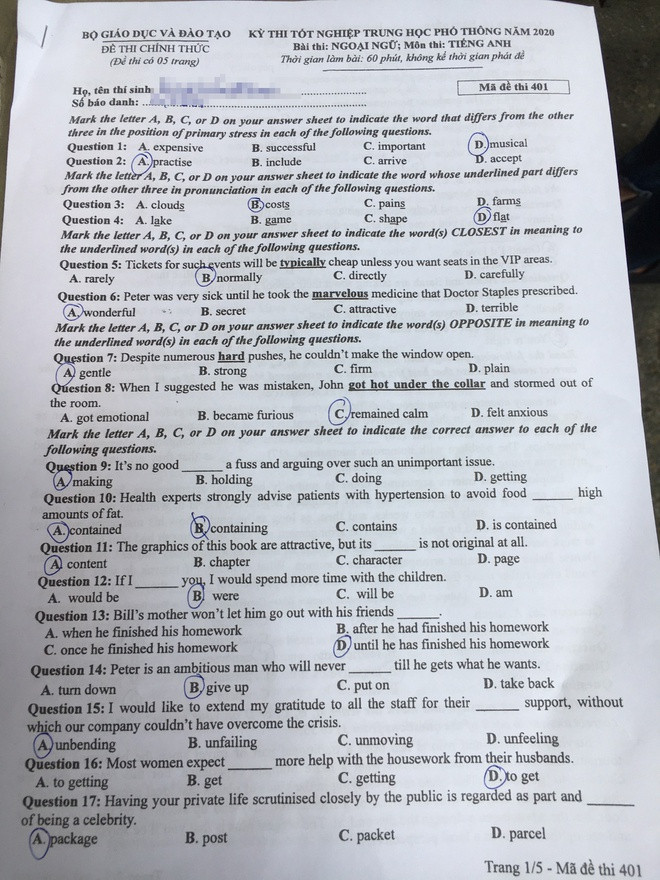

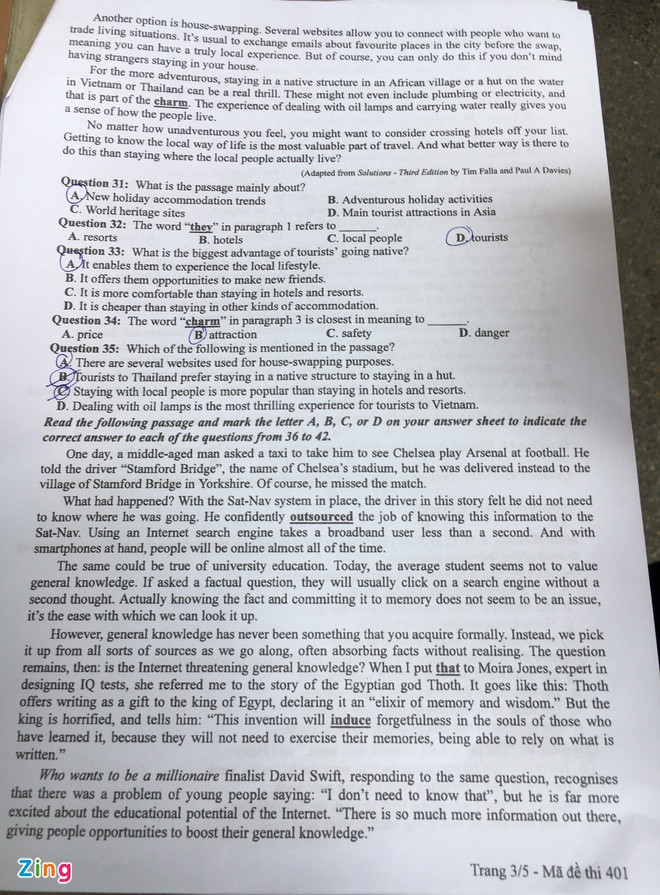
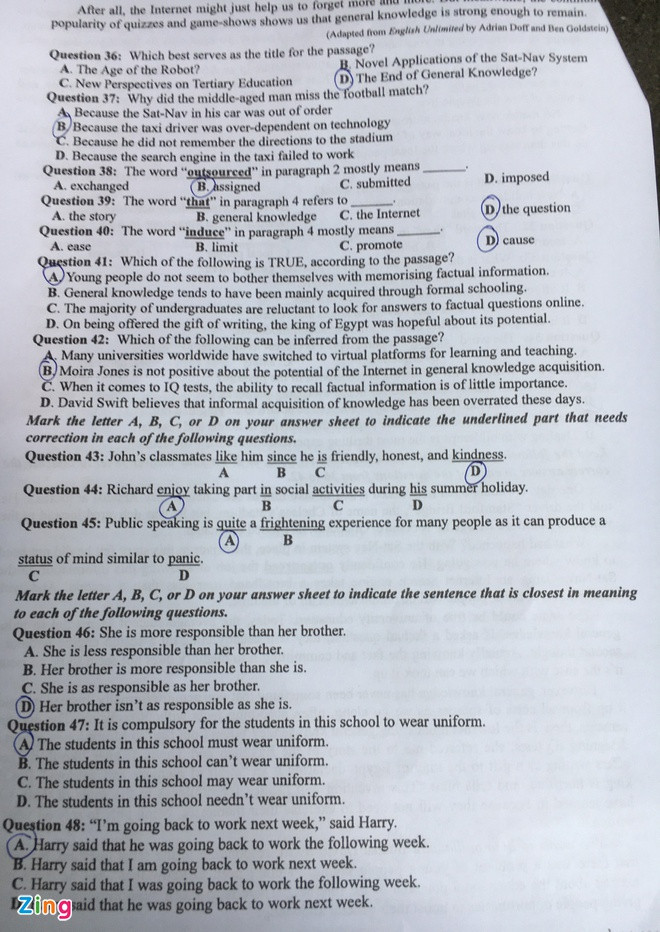
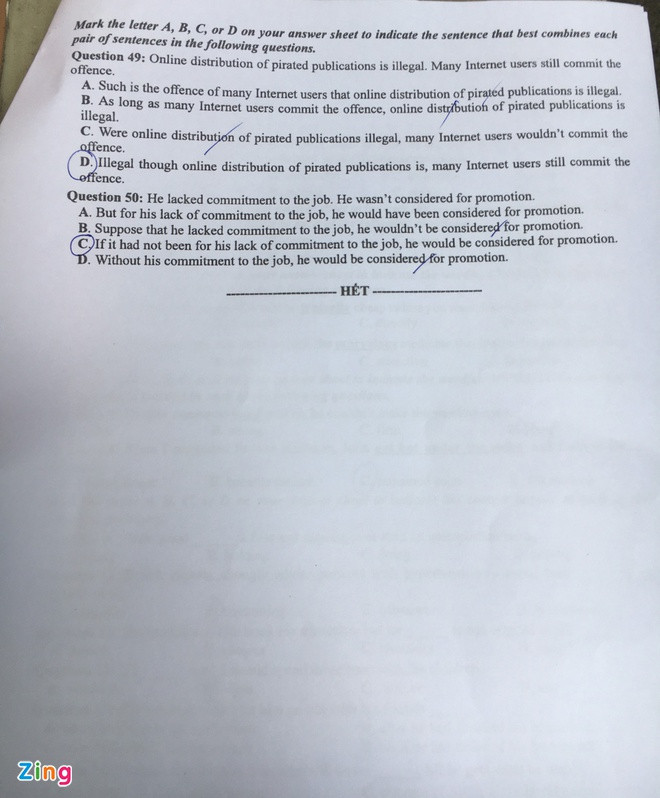
Đáp án Đề thi môn Tiếng Anh THPT Quốc gia 2020 - Mã đề 402


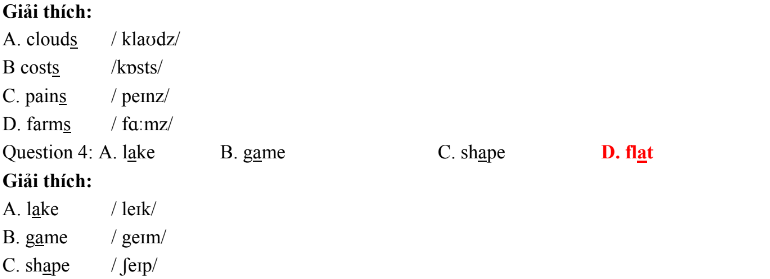
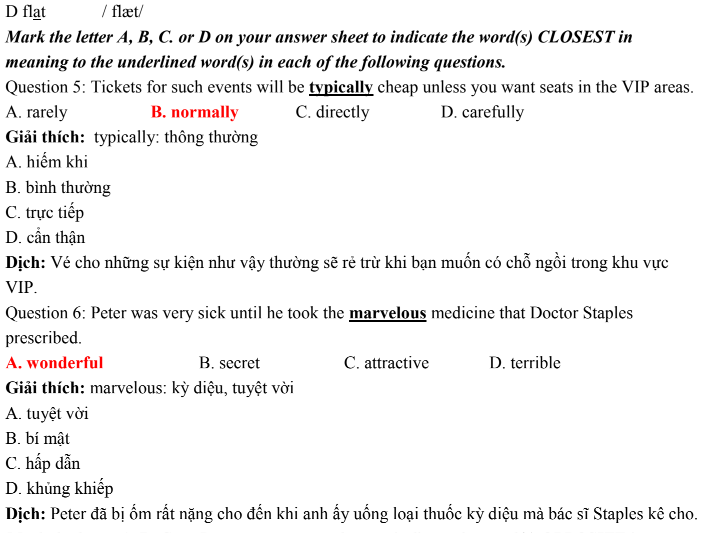
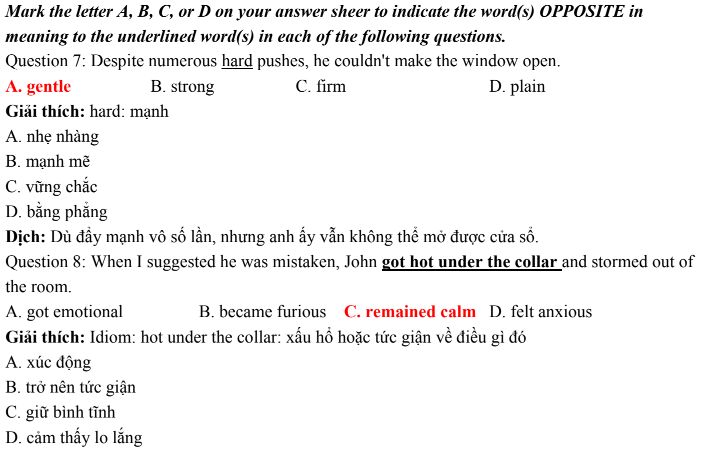
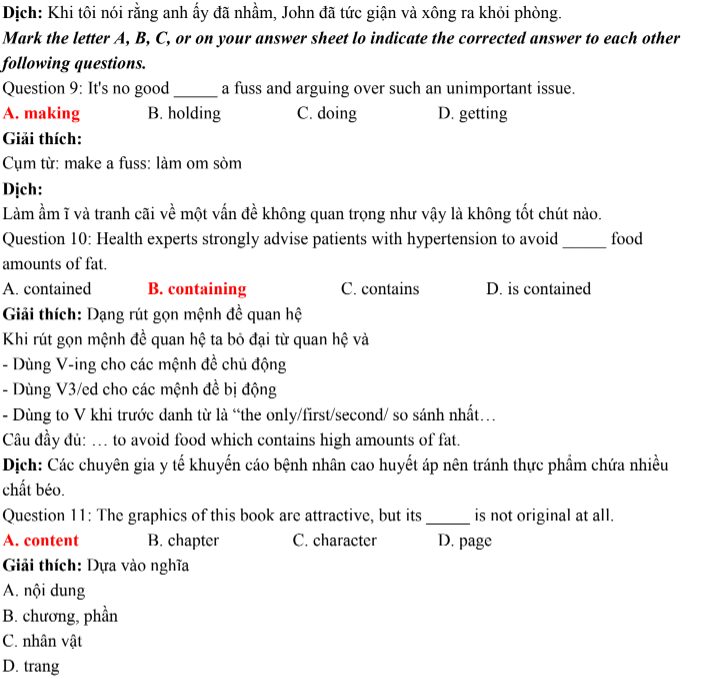
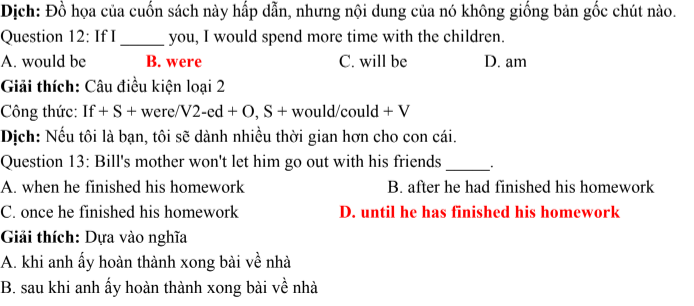
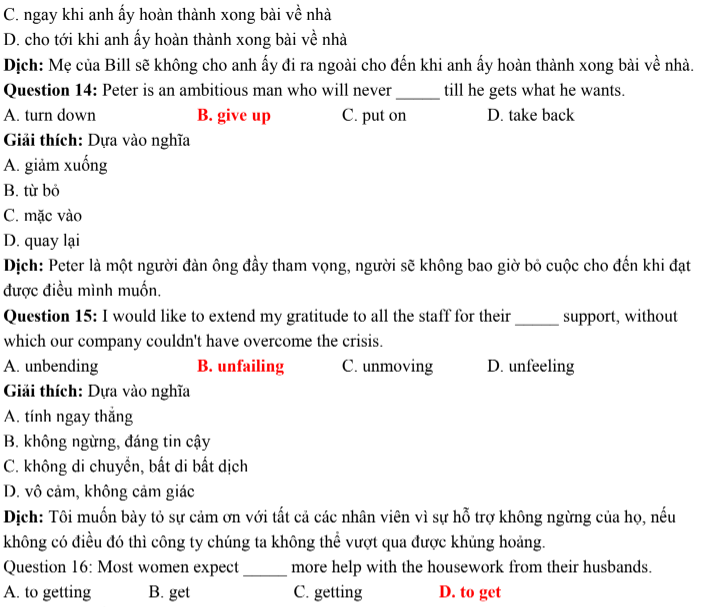
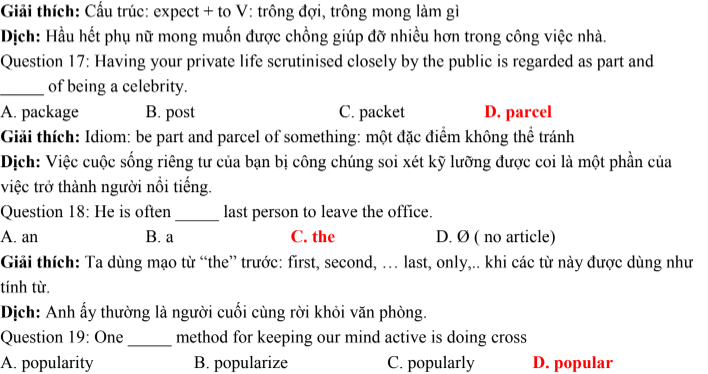
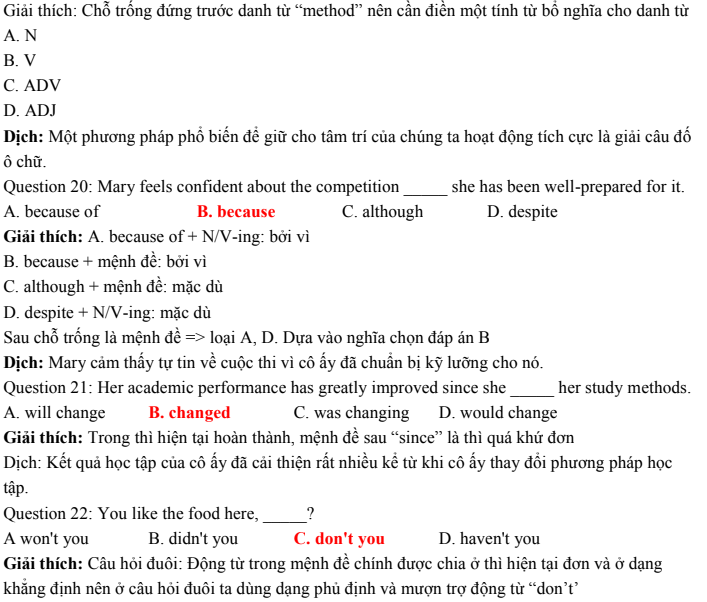

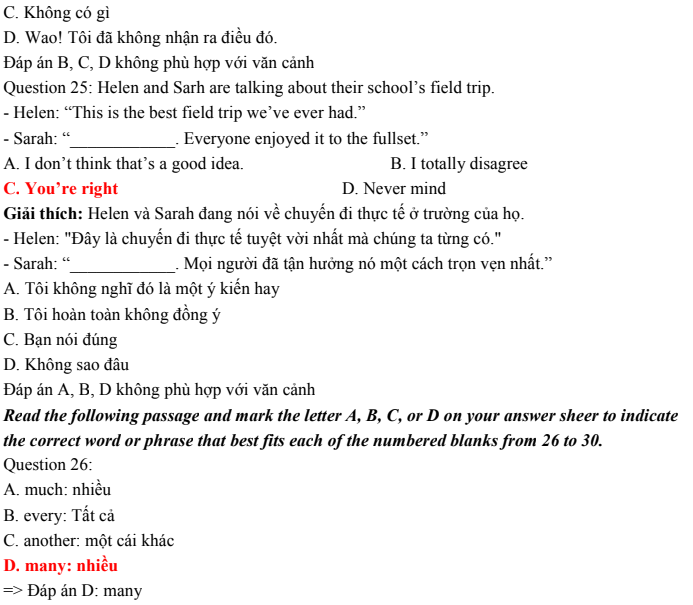
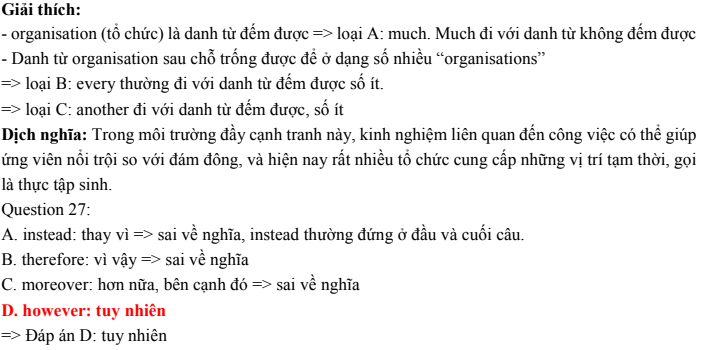
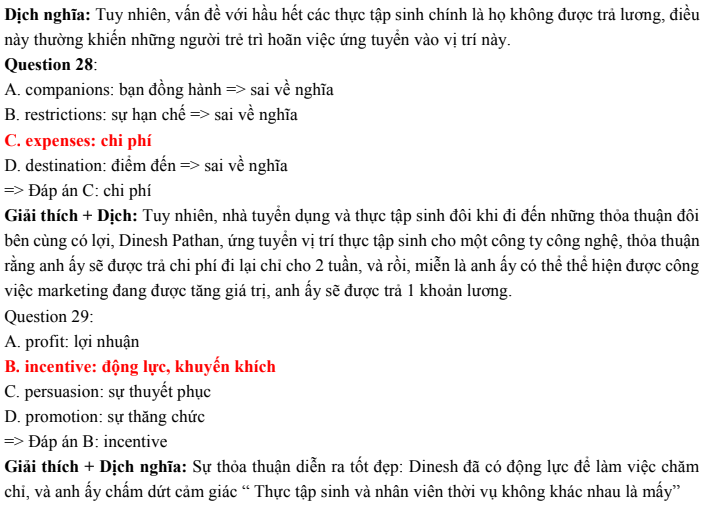
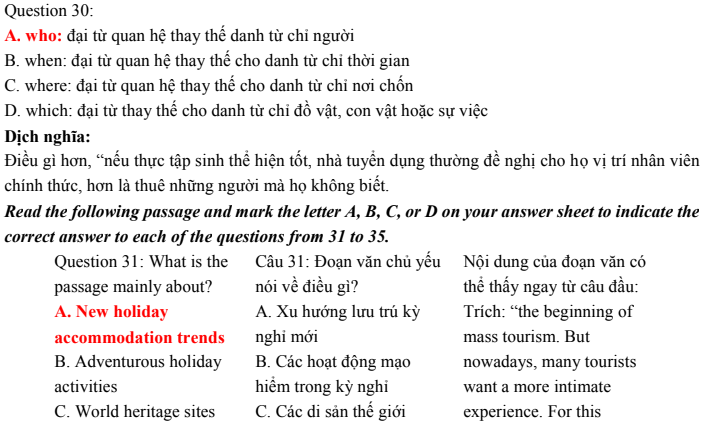
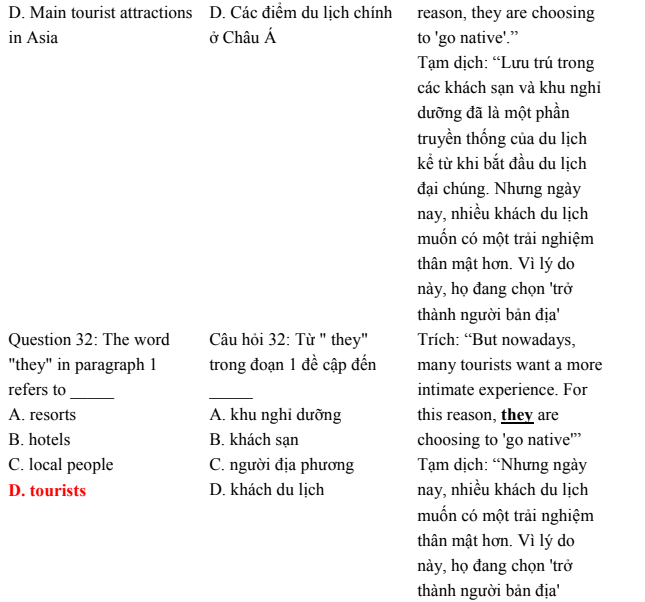
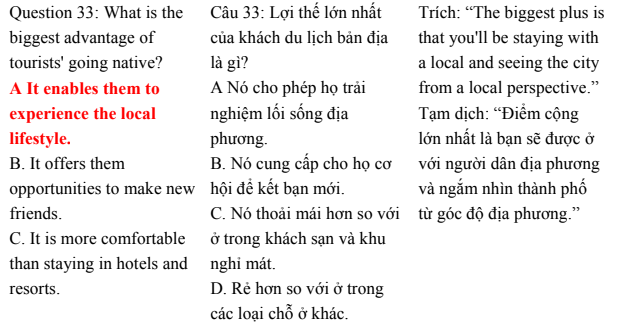
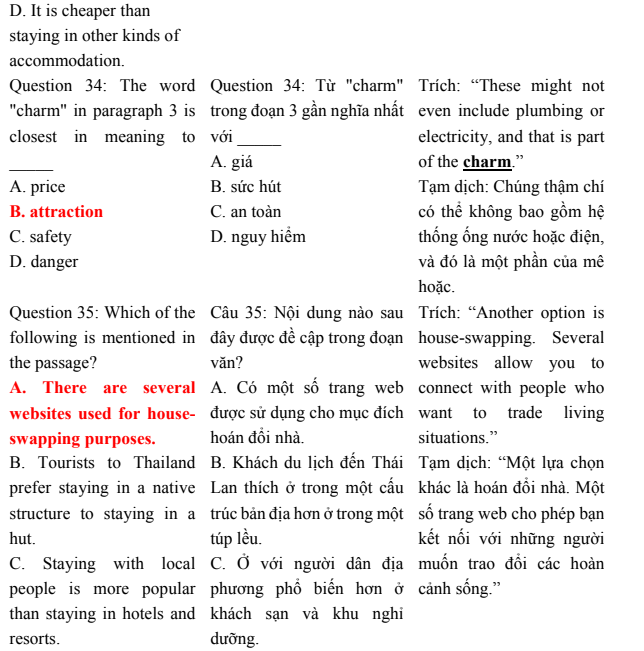
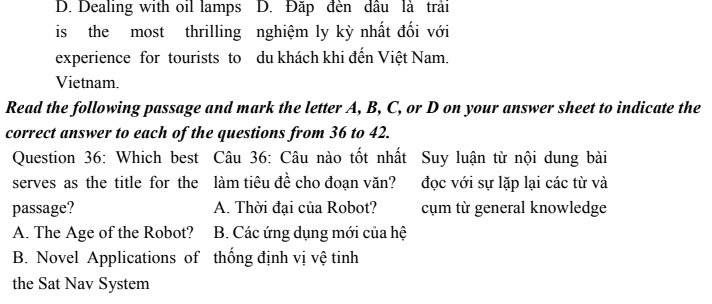
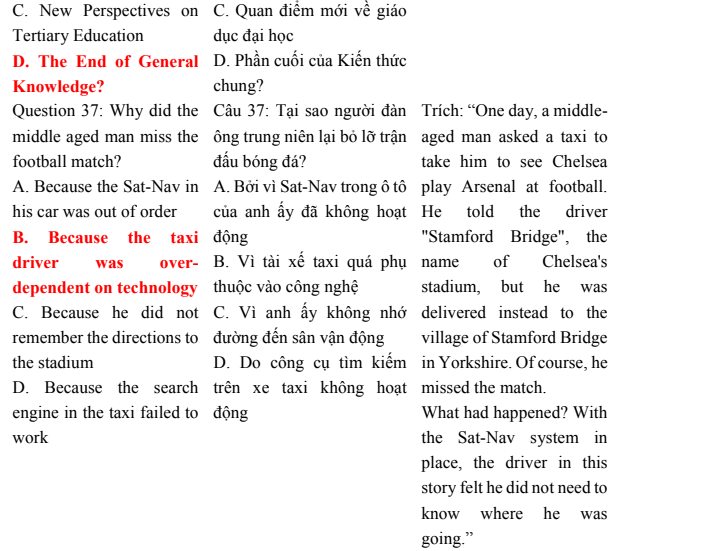
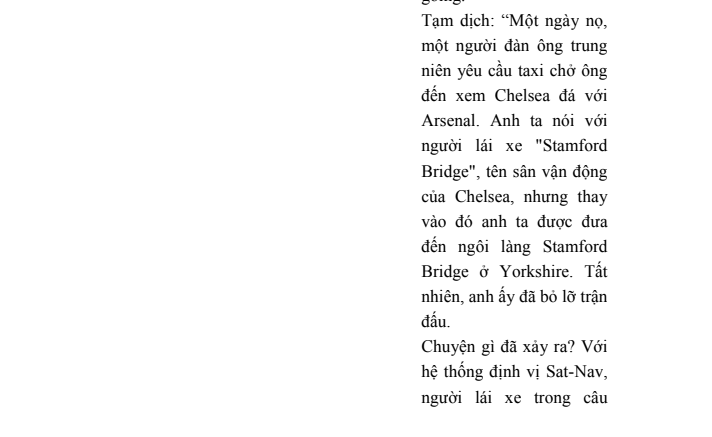
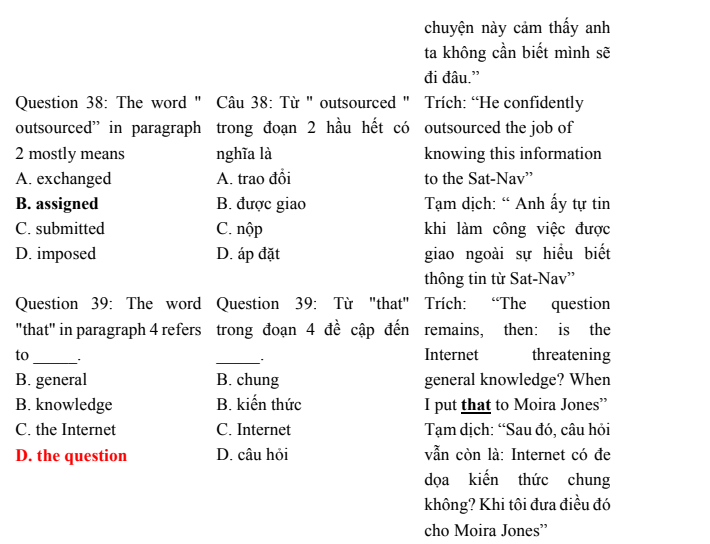
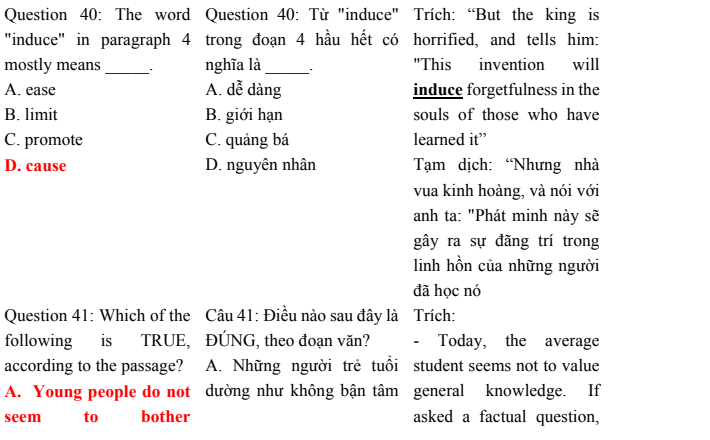
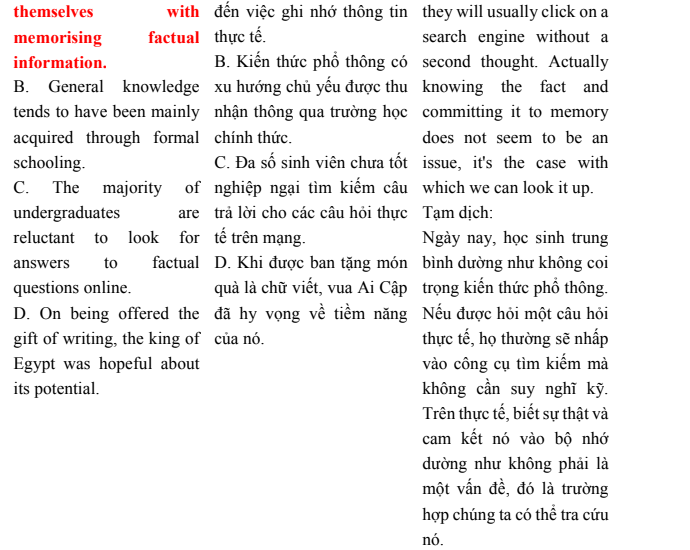
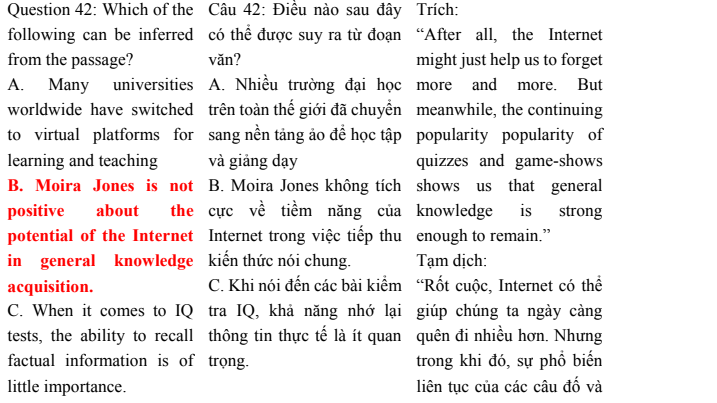
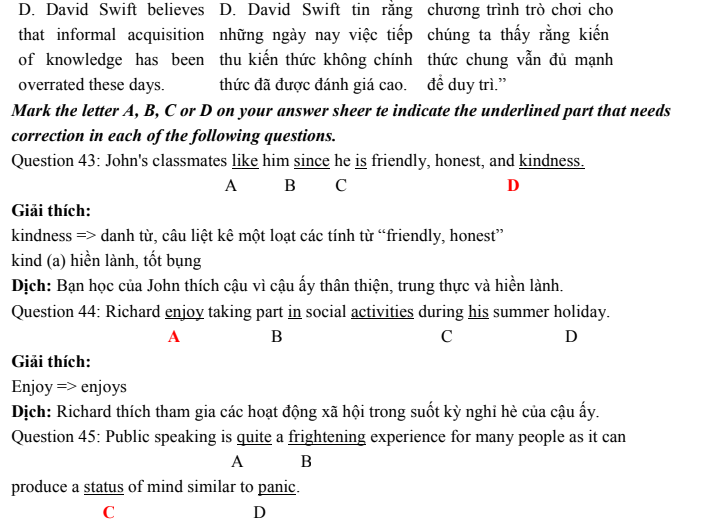
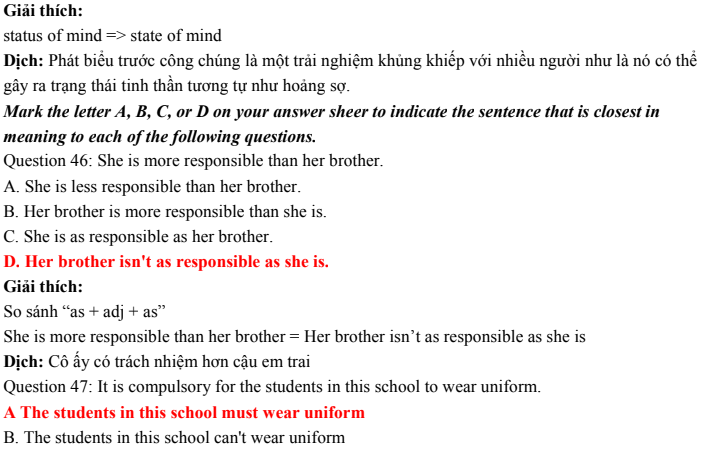
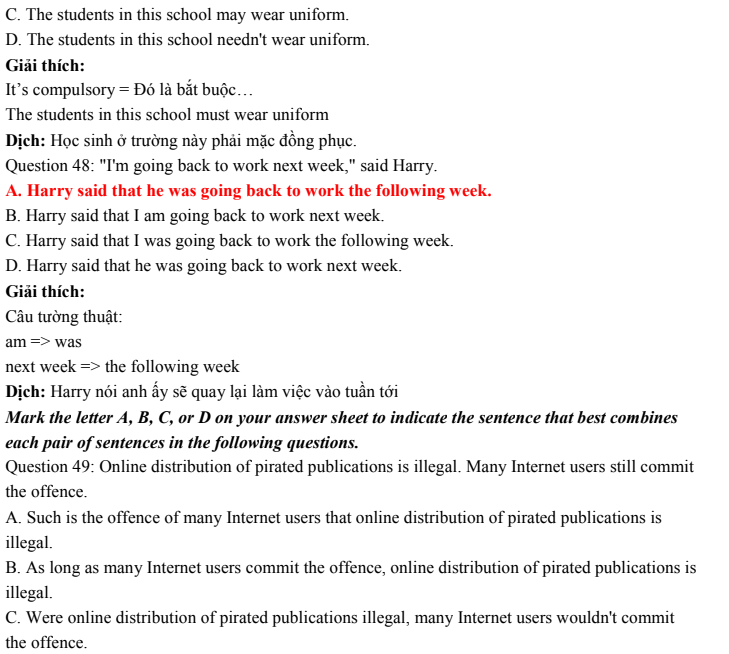

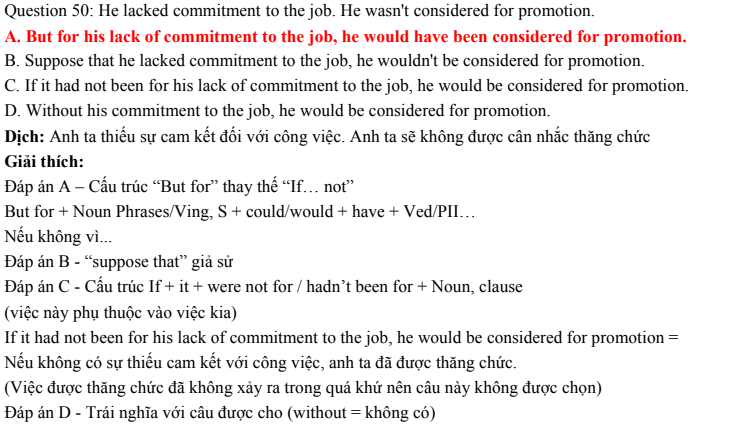
Đề thi môn Tiếng Anh THPT Quốc gia 2020 - Mã đề 402
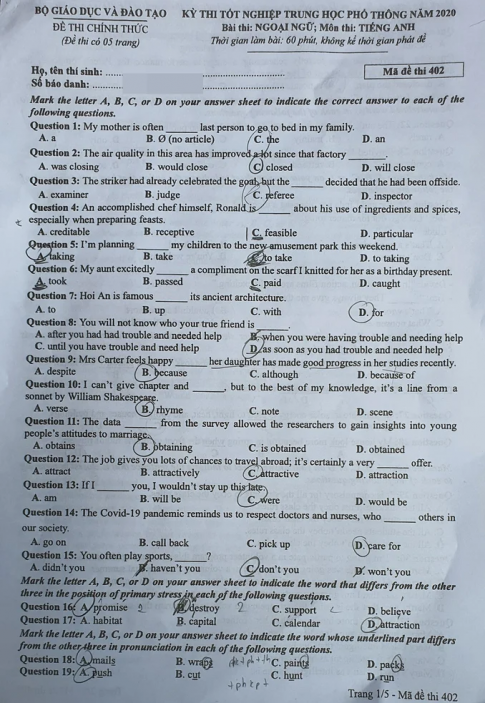
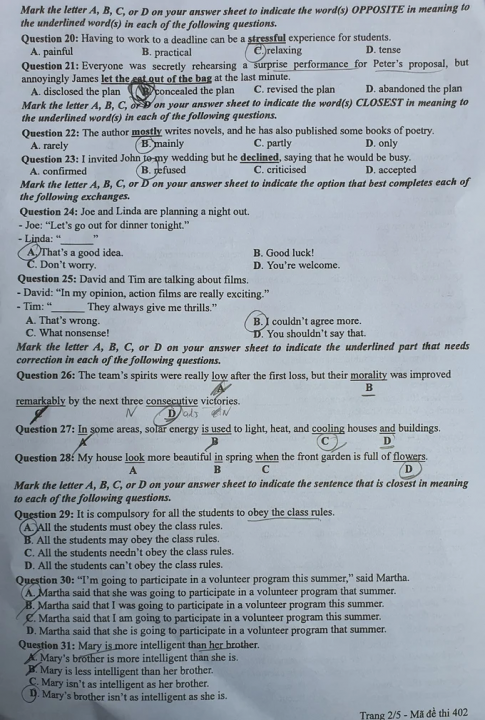
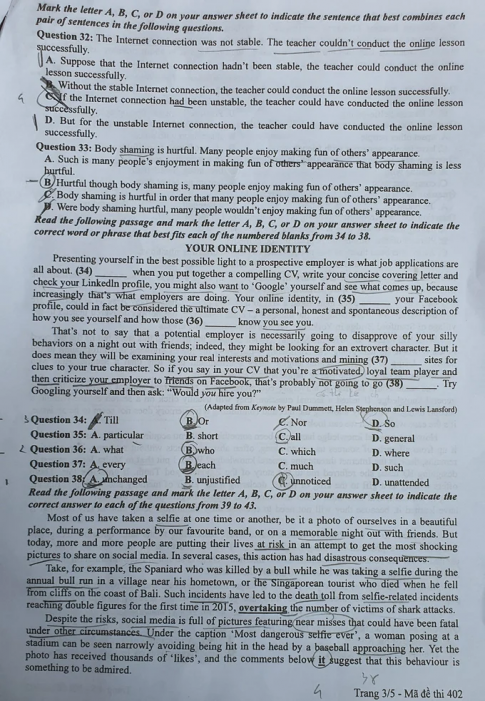
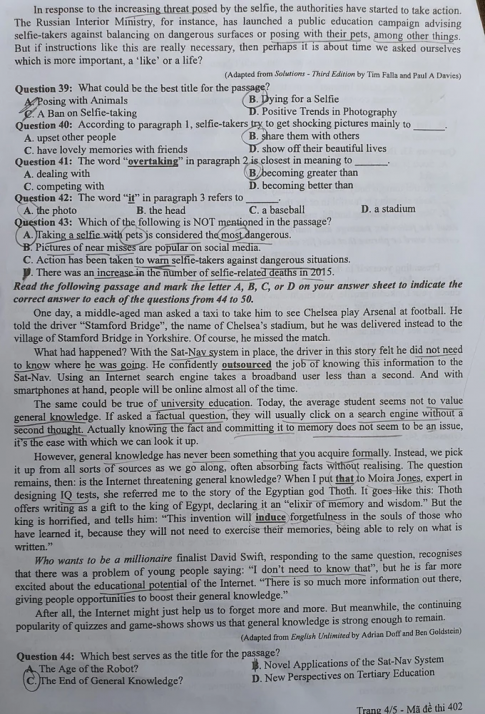
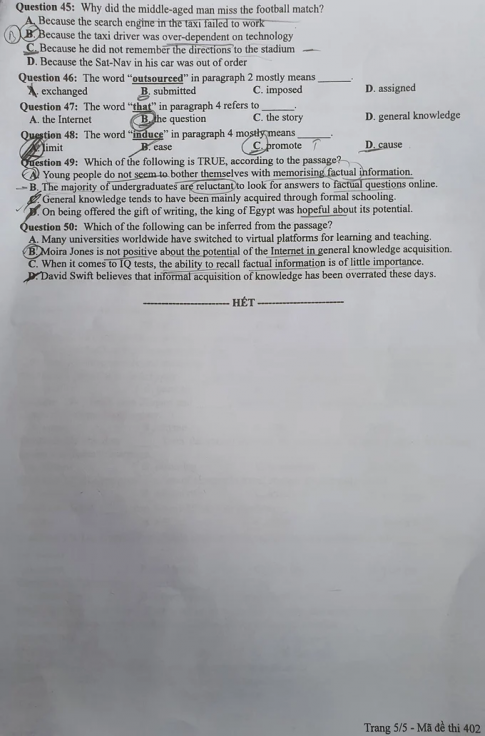
Đáp án Đề thi môn Tiếng Anh THPT Quốc gia 2020 - Mã đề 402

Mark the letter A, B, C, or D on your answer sheet to indicate the correct answer to each of the following questions
Question 1: My mother is often _____ last person to go to bed in my family.
A. a B. Ø (no article) C. the D. an
Giải thích: Ta dùng mạo từ “the” trước: first, second, … last, only,.. khi các từ này được dùng như tính từ.
Dịch: Mẹ tôi thường là người cuối cùng đi ngủ trong gia đình tôi.
Question 2: The air quality in this area has improved a lot since that factory _____.
A. was closing B. would close C. closed D. will close
Giải thích: Trong thì hiện tại hoàn thành, mệnh đề sau “since” là thì quá khứ đơn
Dịch: Chất lượng không khí ở khu vực này đã được cải thiện rất nhiều kể từ khi nhà máy đó đóng cửa.
Question 3: The striker had already celebrated the goal, but the _____ decided that he had been offside.
A. examiner B. judge C. referee D. inspector
Giải thích: Dựa vào nghĩa
A. giám khảo
B. giám khảo
C. trọng tài
D. thanh tra
Dịch: Tiền đạo này đã ăn mừng bàn thắng, nhưng trọng tài quyết định rằng anh ta đã việt vị.
Question 4: An accomplished chef himself, Ronald is _____ about his use of ingredients and spices, especially when preparing feasts.
A. creditable B. receptive C. feasible D. particular
Giải thích: Dựa vào nghĩa
A. đáng khen
B. tiếp thu
C. khả thi, có thể làm được
D. đặc biệt, kỹ càng
Dịch: Bản thân là một đầu bếp giỏi, Ronald kỹ càng về cách sử dụng các nguyên liệu và gia vị, đặc biệt là khi chuẩn bị các bữa tiệc.
Question 5: I'm planning _____ my children to the new amusement park this weekend.
A. taking B. take C. to take D. to taking
Giải thích: Sau động từ plan + to V: có kế hoạch làm gì
Dịch: Cuối tuần này tôi định đưa các con đi công viên giải trí mới.
Question 6: My aunt excitedly _____ a compliment on the scarf I knitted for her as a birthday present.
A. took B. passed C. paid D. caught
Giải thích: Cụm từ: pay a compliment: khen ngợi, ca tụng
Dịch: Dì tôi thích thú khen chiếc khăn tôi đã đan cho bà làm quà sinh nhật.
Question 7: Hoi An is famous _____ its ancient architecture.
A. to B. up C. with D. for
Giải thích: Cấu trúc: tobe famous for: nổi tiếng vì
Dịch: Hội An nổi tiếng với những công trình kiến trúc cổ kính.
Question 8: You will not know who your true friend is _____.
A. after you had had trouble and needed help. B. when you were having trouble and needing help
C. until you have trouble and need help D. as soon as you had trouble and needed help
Giải thích: Dựa vào nghĩa
A. sau khi bạn gặp vấn đề và cần giúp đỡ
B. khi bạn gặp vấn đề và cần giúp đỡ
C. cho đến khi bạn gặp vấn đề và cần giúp đỡ
D. ngay khi bạn gặp vấn đề và cần giúp đỡ
Dịch: Bạn sẽ không biết ai là người bạn thực sự của mình cho đến khi bạn gặp khó khăn và cần sự giúp đỡ.
Question 9: Mrs Carter feels happy _____ her daughter has made good progress in her studies recently.
A. despite B. because C. although D. because of
Giải thích:
A. despite + N/V-ing: mặc dù
B. because + mệnh đề: bởi vì
C. although + mệnh đề: mặc dù
D. because of + N/V-ing: bởi vì
Sau chỗ trống là mệnh đề nên loại đáp án A, D. Dựa vào nghĩa chọn đáp án B
Dịch: Bà Carter cảm thấy vui vì con gái bà có tiến bộ trong học tập gần đây
Question 10: I can't give chapter and _____, but to the best of my knowledge, it's a line from a sonnet by William Shakespeare.
A. verse B. rhyme C. note D. scene
Giải thích: Dựa vào nghĩa
A. câu thơ
B. vần
C. ghi chú
D. cảnh
Dịch: Tôi không thể đưa ra được chương và câu, nhưng theo hiểu biết của tôi, đó là một dòng trong bản sonat của William Shakespeare.
Question 11: The data _____ from the survey allowed the researchers to gain insights into young people's attitudes to marriage.
A. obtains B. obtaining C. is obtained D. obtained
Giải thích: Dạng rút gọn mệnh đề quan hệ
Khi rút gọn mệnh đề quan hệ ta bỏ đại từ quan hệ và
- Dùng V-ing cho các mệnh đề chủ động
- Dùng V3/ed cho các mệnh đề bị động
- Dùng to V khi trước danh từ là “the only/first/second/ so sánh nhất…
Câu đầy đủ: The data which was obtained from the …
Dịch: Dữ liệu thu được từ cuộc khảo sát cho phép các nhà nghiên cứu hiểu rõ hơn về thái độ của giới trẻ đối với hôn nhân.
Question 12: The job gives you lots of chances to travel abroad; it's certainly a very _____ offer.
A. attract B. attractively C. attractive D. attraction
Giải thích: Chỗ trống đứng trước danh từ “offer” nên cần điền tính từ bổ nghĩa cho danh từ
A. V
B. ADV
C. ADJ
D. N
Dịch: Công việc mang đến cho bạn nhiều cơ hội đi du lịch nước ngoài; đó chắc chắn là một đề nghị rất hấp dẫn.
Question 13: If I _____ you, I wouldn't stay up this late.
A. am B. will be C. were D. would be
Giải thích: Câu điều kiện loại 2
Công thức: If + S + were/V2/-ed + O, S + would/could + S
Dịch: Nếu tôi là bạn, tôi sẽ không thức muộn như vậy.
Question 14: The Covid-19 pandemic reminds us to respect doctors and nurses, who _____ others in our society.
A. go on B. call back C. pick up D. care for
Giải thích: Dựa vào nghĩa
A. tiếp tục
B. gọi lại
C. đón, lấy
D. chăm sóc
Dịch: Đại dịch Covid-19 nhắc nhở chúng ta tôn trọng các bác sĩ và y tá, những người chăm sóc cho những người khác trong xã hội của chúng ta.
Question 15: You often play sports, _____?
A. didn't you B. haven't you C. don't you D. won't you
Giải thích: Trong mệnh đề chính động từ được chia ở thì hiện tại đơn và ở dạng khẳng định nên trong câu hỏi đuôi ta chia ở dạng phủ định và mượn trợ động từ “don’t”
Dịch: Bạn thường chơi thể thao, phải không?
Mark the letter A, B, C, or D on your answer sheet to indicate the word that differs from the other three in the position of primary stress in each of the following questions.
Question 16: A. promise B. destroy C. support D. believe
Giải thích:
A. promise /ˈprɒmɪs/
B. destroy / dɪsˈtrɔɪ/
C. support /səˈpɔːt /
D. believe / bɪˈliːv/
Trọng âm không rơi vào những âm yếu như /ə/ hoặc /i/ => đáp án A trọng âm rơi vào âm tiết 1
Đáp án B, C, D là động từ 2 âm tiết, trọng âm rơi vào âm tiết thứ 2
Question 17: A. habitat B. capital C. calendar D. attraction
Giải thích:
A. habitat /ˈhæbɪtæt/
B. capital /ˈkæpɪtl/
C. calendar /ˈkælɪndə/
D. attraction /əˈtrækʃ(ə)n/
Đáp án A, B, C là danh từ 3 âm tiết trọng âm thường rơi vào âm tiết 1
Đáp án D có đuôi –ion trọng âm rơi vào âm tiết ngay trước nó (âm tiết 2)
Mark the letter A, B, C, or D on your answer sheet to indicate the word whose underlined part differs from the other three in pronunciation in each of the following questions.
Question 18: A. mails B. wraps C. paints D. packs
Giải thích:
A. mails / meɪlz/
B. wraps / ræps/
C. paints / peɪnts/
D. packs / pæks/
Question 19: A. push B.cut C. hunt D. run
Giải thích:
A. push /pʊʃ/
B.cut /kʌt/
C. hunt /hʌnt/
D. run / rʌn/
Mark the letter A, B, C, or D on your answer sheet to indicate the word(s) OPPOSITE in meaning to the underlined word(s) in each of the following questions.
Question 20: Having to work to a deadline can be a stressful experience for students.
A. painful B. practical C. relaxing D. tense
Giải thích: stressful: áp lực
A. đau đớn
B. thực tế
C. thư giãn
D. căng thẳng
Dịch: Phải làm việc để đáp ứng thời hạn có thể là một trải nghiệm căng thẳng đối với sinh viên.
Question 21: Everyone was secretly rehearsing a surprise performance for Peter's proposal, but annoyingly James let the cat out of the bag at the last minute.
A. disclosed the plan B. concealed the plan C. revised the plan D. abandoned the plan
Giải thích: let the cat out of the bag: để lộ bí mật
A. tiết lộ kế hoạch
B. che giấu kế hoạch
C. sửa đổi kế hoạch
D. từ bỏ kế hoạch
Dịch: Mọi người đã bí mật tập luyện một màn trình diễn bất ngờ cho lời cầu hôn của Peter, nhưng James đã làm lộ bí mật vào phút cuối.
Question 22:
A. rarely: hiếm khi, ít khi
B. mainly: chủ yếu
C. partly: từng phần
D. only: chỉ
=> Đáp án: B
Giải thích: mostly (adv) hầu hết
Dịch: Tác giả hầu hết (là) viết tiểu thuyết, và anh ấy cũng xuất bản một vài quyển thơ.
Question 23
A. confirmed: xác nhận
B. refused: từ chối
C. criticised: chỉ trích
D. accepted: chấp nhận
=> Đáp án: B
Giải thích: decline (v) từ chối
Dịch: Tôi đã mời John đến đám cưới của mình nhưng anh ấy từ chối, nói rằng anh ấy bận.
Question 24:
A. That's a good idea: Ý kiến hay đó.
B. Chúc may mắn!
C. Đừng lo lắng.
D. Không có chi.
=> Đáp án A
Giải thích + Dịch:
- Joe: Tối nay đi ra ngoài ăn đi.
- Linda: Ý kiến hay đó.
Question 25
A. Sai rồi
B. Không thể đồng ý hơn (Hoàn toàn đồng ý)
C. Vớ vẩn
D. Bạn không nên nói như vậy
=> Đáp án B
Giải thích + Dịch:
- David: Với tôi, phim hành động thực sự thú vị.
- Tim: Hoàn toàn đồng ý, chúng luôn khiến tôi cảm thấy cực kì thích thú
Question 26:
A: low: đúng ngữ pháp (sau tobe + adj), hợp văn cảnh
B: morality (n) đạo đức => Không hợp văn cảnh
C: remarkably: đúng ngữ pháp (sau động từ + adv), hợp văn cảnh
D: consecutive: đúng ngữ pháp, cụm danh từ = tính từ + danh từ, hợp văn cảnh
Giải thích + Dịch: Toàn đội đã xuống tinh thần sau trận thu đầu tiên, nhưng đạo đức của họ đã tăng trở lại nhanh chóng sau 3 chiến thắng liên tiếp.
Question 27:
A. In
B. is used
C. cooling
D. and
=> Đáp án C
Giải thích: Ở đây đang liệt kê một loại các hoạt động có thể sử dụng năng lương mặt trời, chính vì vậy trước và sau từ “and” các từ đều cần phải ở cùng một loại từ.
light (n) thiết bị thắp sáng
heat (n) thiết bị sưởi ấm
buildings (n) các tòa nhà
Như vậy vị trí của đáp án C cần 1 danh từ. Chứ không phải danh động từ.
Dịch: Ở một vài nơi, năng lượng mặt trời được dùng cho thiết bị chiếu sáng, thiết bị sưởi ấm, làm mát nhà ở và các tòa nhà.
Question 28:
A. look
B. in
C. when
D. flowers
=> Đáp án A
Giải thích: My house là danh từ số ít, đếm được chính vì vậy động từ theo sau chủ ngày này phải chia ở dạng số ít: thêm -s/ -es. Động từ “look” đang để ở dạng nguyên thể không chia => Sai ngữ pháp
Dịch: Ngôi nhà của tôi nhìn đẹp hơn vào mùa xuân khi mảnh vườn phía trước ngập tràn hoa.
Question 29
Dịch + Giải thích:
Điều đó là bắt buộc đối với tất cả học sinh phải tuân thủ các quy định của lớp học.
A. Tất cả học sinh phải tuân thủ quy định của lớp học.
B. Tất cả học sinh có thể tuân thủ quy định của lớp học.
C. Tát cả học sinh không cần tuân thủ quy định của lớp học.
D. Tất cả học sinh không thể tuân thủ quy định của lớp học.
=> Đáp án A.
Question 30:
Giải thích:
A. Lùi thì + đổi chủ ngữ => Đúng
B. Loại luôn do không đổi chủ ngữ, vẫn để “I was going”, this không đổi thành “that”
C. Loại luôn do không đổi chủ ngữ, vẫn để “I was going”, this không đổi thành “that”
D. Loại luôn do không lùi thì, vẫn để “she is going”
=> Đáp án A
Dịch: “Tôi sẽ tham gia một trương trình tình nguyện vào mùa hè này”, Martha nói
Câu trực tiếp, gián tiếp
A. Martha nói rằng cô ấy sẽ tham gia một chương trình tình nguyện vào mùa hè.
B. Martha nói rằng tôi sẽ tham gia chương trình tình nguyện vào mùa hè này.
C. Martha nói rằng tôi sẽ tham gia chương trình tình nguyện vào mùa hè này.
D. Martha nói rằng cô ấy sẽ tham gia một chương trình tình nguyện vào mùa hè.
Question 31:
Giải thích + Dịch: Mary > her brother
A. Em trai của Mary thì thông minh hơn cô ấy. (em trai > Mary => sai)
B. Mary thì ít thông minh hơn em trai của cô ấy (Mary < em trai => sai)
C. Mary không thông minh bằng em trai của cô ấy (Mary < em trai => sai)
D. Em trai của Mary không thông minh bằng cô ấy
=> Đáp án D
Question 32:
Dịch + Giải thích: Kết nối mạng không ổn định. Giáo viên đã không thể thực hiện bài học trực tuyến thành công
A. Giả sử kết nối mạng không ổn định, cô giáo có thể thực hiện bài học trực tuyến thành công => Sai về nghĩa.
B. Không có kết nối mạng ổn định, cô giáo có thể thực hiện bài học trực tuyến thành công => Sai về nghĩa
C. Nếu kết nối mạng không ổn định, cô giáo đã có thể thực hiện bài học trực tuyển thành công. => Sai về nghĩa.
D. Nếu không vì kết nối mạng chập chờn, giáo viên đã có thể thực hiện bài học trực tuyến thành công.
Question 33:
=> Đáp án B.
Giải thích + Dịch nghĩa:
Chế giễu ngoại hình thì gây tổn thương. Rất nhiều người thích thú với việc mang vẻ bề ngoài của người khác ra để chế giễu.
A. Có quá nhiều người mang ngoại hình của người khác ra làm trò vui đến nỗi mà việc chế giễu ngoại hình ít gây tổn thương hơn.=> Sai về nghĩa
B. Dù việc chế giễu ngoại hình gây tổn thương, rất nhiều người vẫn lấy vẻ bề ngoài của người khác ra làm trò vui.
C. Chế giễu ngoại hình thì tổn thương để mà có rất nhiều người mang vẻ bề ngoài của người khác ra làm trò vui.
=> Sai về nghĩa
D. Nếu việc chế giễu ngoại hình gây tổn thương, nhiều người sẽ không mang ngoại hình của người khác ra làm trò vui.
=> Sai về nghĩa.
Read the following passage and mark the letter A, B, C, or D on your answer sheet to indicate the correct word or phrase that best fits each of the numbered blanks from 34 to 38.
YOUR ONLINE IDENTITY
Presenting yourself in the best possible light to a prospective employer is what job applications are all about. (34) _____ when you put together a compelling CV, write your concise covering letter and check your Linkedin profile, you might also want to 'Google' yourself and see what comes up, because increasingly that's what employers are doing. Your online identity, in (35) _____ your Facebook profile, could in fact be considered the ultimate CV- a personal, honest and spontaneous description of how you see yourself and how those (36) _____ know you see you.
That's not to say that a potential employer is necessarily going to disapprove of your silly behaviors on a night out with friends, indeed, they might be looking for an extrovert character. But it does mean they will be examining your real interests and motivations and mining (37) _____ sites for clues to your true character. So if you say in your CV that you're a motivated, loyal team player and then criticize your employer to friends on Facebook, that's probably not going to go (38) _____ Try Googling yourself and then ask: "Would you hire you?"
(Adapted from Keynote by Paul Dummett, Helen Stephenson and Lewis Lansford)
Question 34:
Giải thích: Dựa vào nghĩa
A. Till: trước khi, cho tới khi ? sai về nghĩa
B. Or: hoặc, tức là, hay là ? sai về nghĩa
C. Nor: cũng không ? sai về nghĩa
D. So : vì vậy, vì lẽ đó, thế là Thường dùng để chỉ kết quả
Dịch: Thể hiện bản thân với quan niệm đúng nhất trước một nhà tuyển dụng tiềm năng là những gì mà đơn xin việc hướng đến. Vì vậy, khi bạn tập hợp một CV hấp dẫn, thư xin việc viết tay ngắn gọn và kiểm tra hồ sơ trên Linkedin của bạn, bạn cũng có thể muốn tự mình 'Google' và xem điều gì xuất hiện, vì ngày càng có nhiều điều mà nhà tuyển dụng đang làm.
Question 35:
Giải thích: Dựa vào nghĩa
In + particular cụ thể, nói riêng, đặc biệt
In + short nói tóm lại
In + all trong tất cả các
In + general nhìn chung, nói chung
Dịch: Danh tính trực tuyến của bạn, đặc biệt là hồ sơ Facebook của bạn, trên thực tế có thể được coi là CV cuối cùng - một bản mô tả cá nhân, trung thực và ngẫu hứng về cách bạn nhìn nhận bản thân và cách những người biết bạn nhìn nhận bạn.
Question 36:
Giải thích:
A. what là từ để hỏi không phải là đại từ quan hệ hay trạng từ quan hệ
B who đại từ quan hệ thay thế danh từ chỉ người
C. which đại từ thay thế cho danh từ chỉ đồ vật, con vật hoặc sự việc
D. where trạng từ quan hệ dùng thay thế cho danh từ chỉ nơi chốn
Dịch:
Một bản mô tả cá nhân, trung thực và ngẫu hứng về cách bạn nhìn nhận bản thân và cách những người biết bạn nhìn nhận bạn.
Question 37:
Giải thích:
A. every: mỗi, mọi
B. each: mỗi
C. much: nhiều
D. such: như
Dịch: Nhưng điều đó có nghĩa là họ sẽ xem xét sở thích và động cơ thực sự của bạn và khai thác các trang web đó để tìm manh mối về tính cách thực sự của bạn.
Question 38:
Giải thích:
A. unchanged không bị thay đổi
B. unjustified không hợp lý, phi lý
C. unnoticed bị làm ngơ, bị bỏ qua
D. unattended không được giám sát
Giải thích:
Dịch: Vì vậy, nếu bạn nói trong CV rằng bạn là một cầu thủ năng động, trung thành trong đội và sau đó chỉ trích nhà tuyển dụng của bạn với bạn bè trên Facebook, điều đó có lẽ sẽ không được chú ý. Hãy thử tự lên Google và hỏi: "Bạn có thuê bạn không?"
Read the following passage and mark the letter A, B, C, or D on your answer sheet to indicate the correct answer to each of the questions from 39 to 43.
Most of us have taken a selfie at one time or another, be it a photo of ourselves in a beautiful place, during a performance by our favourite band, or on a memorable night out with friends. 39But today, more and more people are putting their lives at risk in an attempt to get the most shocking pictures 40to share on social media. In several cases, this action has had disastrous consequences.
Take, for example, the Spaniard who was killed by a bull while he was taking a selfie during the annual bull run in a village near his hometown, or the Singaporean tourist who died when he fell from cliffs on the coast of Bali. 41, 43dSuch incidents have led to the death toll from selfie-related incidents reaching double figures for the first time in 2015, overtaking the number of victims of shark attacks.
Despite the risks, 43bsocial media is full of pictures featuring near misses that could have been fatal under other circumstances. Under the caption 'Most dangerous selfie ever', a woman posing at a stadium can be seen narrowly avoiding being hit in the head by a baseball approaching her. 42Yet the photo has received thousands of 'likes', and the comments below it suggest that this behaviour is something to be admired.
43cIn response to the increasing threat posed by the selfie, the authorities have started to take action. The Russian Interior Ministry, for instance, has launched a public education campaign advising selfie-takers against balancing on dangerous surfaces or posing with their pets, among other things. But if instructions like this are really necessary, then perhaps it is about time we asked ourselves which is more important, a 'like' or a life?
(Adapted from Solutions - Third Edition by Tim Falla and Paul A Davies)
Question 39: What could be the best title for the passage?
A. Posing with Animals
B. Dying for a Selfie
C. A Ban on Selfie-taking
D. Positive Trends in Photography
Giải thích:
Câu 39: Tiêu đề hay nhất cho đoạn văn có thể là gì?
A. Tạo dáng với động vật
B. Chết vì chụp ảnh tự sướng
C. Cấm chụp ảnh tự sướng
D. Xu hướng Tích cực trong Nhiếp ảnh
Dịch:
Nhưng ngày nay, ngày càng có nhiều người đặt tính mạng của mình vào nguy hiểm để cố gắng có được những bức ảnh gây sốc nhất để chia sẻ trên mạng xã hội. Trong một số trường hợp, hành động này đã gây ra hậu quả tai hại.
Question 40: According to paragraph 1, selfie-takers try to get shocking pictures mainly to ___.
A. upset other people
B. share them with others
C. have lovely memories with friends
D. show off their beautiful lives
Giải thích:
Câu hỏi 40: Theo đoạn 1, những người chụp ảnh tự sướng cố gắng chụp những bức ảnh gây sốc chủ yếu để ___.
A. làm người khác buồn
B. chia sẻ chúng với những người khác
C. có những kỉ niệm đáng yêu với bạn bè
D. khoe cuộc sống tươi đẹp của họ
Dịch:
để chia sẻ trên mạng xã hội
Question 41: The word "overtaking" in paragraph 2 is closest in meaning to ___.
A. dealing with
B. becoming greater than
C. competing with
D. becoming better than
Giải thích:
Question 41: Từ " overtaking " trong đoạn 2 gần nghĩa nhất với ___.
A. đối phó với
B. trở nên lớn hơn
C. cạnh tranh với
D. trở nên tốt hơn
Dịch:
Những sự cố như vậy đã khiến số người chết vì các sự cố liên quan đến chụp ảnh tự sướng đạt con số gấp đôi lần đầu tiên vào năm 2015, vượt qua số nạn nhân của các vụ cá mập tấn công.
Question 42: The word "it" in paragraph 3 refers to ____
A. the photo
B. the head
C. a baseball
D. a stadium
Giải thích:
Question 42: Từ "it" trong đoạn 3 đề cập đến ____
A. bức ảnh
B. cái đầu
C. một quả bóng chày
D. một sân vận động
Dịch:
Vậy mà bức ảnh đã nhận được hàng nghìn lượt 'like' và những bình luận bên dưới cho rằng hành vi này thật đáng khâm phục.
Question 43: Which of the following is NOT mentioned in the passage?
A. Taking a selfie with pets is considered the most dangerous.
B. Pictures of near misses are popular on social media.
C. Action has been taken to warn selfie-takers against dangerous situations.
D. There was an increase in the number of selfie-related deaths in 2015.
Giải thích:
Câu 43: Nội dung nào sau đây KHÔNG được đề cập trong đoạn văn?
A. Chụp ảnh tự sướng với thú cưng được coi là nguy hiểm nhất.
B. Hình ảnh của những lần suýt trượt phổ biến trên mạng xã hội.
C. Hành động đã được thực hiện để cảnh báo những người chụp ảnh tự sướng trước những tình huống nguy hiểm.
D. Số ca tử vong liên quan đến chụp ảnh tự sướng tăng lên trong năm 2015.
Dịch:
- phương tiện truyền thông xã hội đầy rẫy những bức ảnh về những vụ trượt chân suýt có thể gây tử vong trong những trường hợp khác.
- Trước mối đe dọa ngày càng gia tăng từ việc chụp ảnh tự sướng, các nhà chức trách đã bắt đầu vào cuộc. Ví dụ, Bộ Nội vụ Nga đã phát động một chiến dịch giáo dục cộng đồng khuyến cáo
- Những sự cố như vậy đã khiến số người chết vì các sự cố liên quan đến chụp ảnh tự sướng đạt con số gấp đôi lần đầu tiên vào năm 2015, vượt qua số nạn nhân của các vụ cá mập tấn công.
Read the following passage and mark the letter A, B, C, or D on your answer sheet to indicate the correct answer to each of the questions from 44 to 50.
45One day, a middle-aged man asked a taxi to take him to see Chelsea play Arsenal at football. He told the driver "Stamford Bridge", the name of Chelsea's stadium, but he was delivered instead to the village of Stamford Bridge in Yorkshire. Of course, he missed the match.
What had happened? With the Sat-Nay system in place, the driver in this story felt he did not need to know where he was going. 46He confidently outsourced the job of knowing this information to the Sat-Nav. Using an Internet search engine takes a broadband user less than a second. And with smartphones at hand, people will be online almost all of the time.
The same could be true of university education. 49Today, the average student seems not to value general knowledge. If asked a factual question, they will usually click on a search engine without a second thought. Actually knowing the fact and committing it to memory does not seem to be an issue, it's the ease with which we can look it up.
However, general knowledge has never been something that you acquire formally. Instead, we pick it up from all sorts of sources as we go along, often absorbing facts without realising. 47The question remains, then: is the Internet threatening general knowledge? When I put that to Moira Jones, expert in designing IQ tests, she referred me to the story of the Egyptian god Thoth. It goes like this: Thoth offers writing as a gift to the king of Egypt, declaring it an "elixir of memory and wisdom."48 But the king is horrified, and tells him: "This invention will induce forgetfulness in the souls of those who have learned it, because they will not need to exercise their memories, being able to rely on what is written."
Who wants to be a millionaire finalist David Swift, responding to the same question, recognises that there was a problem of young people saying: "I don't need to know that", but he is far more excited about the educational potential of the Internet. "There is so much more information out there, giving people opportunities to boost their general knowledge."
50After all, the Internet might just help us to forget more and more. But meanwhile, the continuing popularity of quizzes and game-shows shows us that general knowledge is strong enough to remain.
(Adapted from English Unlimited by Adrian Doff and Ben Goldstein)
Question 44: Which best serves as the title for the passage?
A. The Age of the Robot?
B. Novel Applications of the Sat-Nav System
C. The End of General Knowledge?
D. New Perspectives on Tertiary Education
Giải thích:
Câu 44: Câu nào tốt nhất làm tiêu đề cho đoạn văn?
A. Thời đại của Robot?
B. Các ứng dụng mới của hệ thống định vị vệ tinh
C. Phần cuối của Kiến thức chung?
D. Quan điểm mới về giáo dục đại học
Question 45: Why did the middle-aged man miss the football match?
A. Because the search engine in the taxi failed to work
B. Because the taxi driver was over-dependent on technology
C. Because he did not remember the directions to the stadium
D. Because the Sat-Nav in his car was out of order
Giải thích:
Câu 45: Tại sao người đàn ông trung niên bỏ lỡ trận bóng đá?
A. Vì công cụ tìm kiếm trên taxi không hoạt động
B. Vì tài xế taxi quá phụ thuộc vào công nghệ
C. Vì anh ấy không nhớ đường đến sân vận động
D. Bởi vì Sat-Nav trong xe của anh ấy đã không hoạt động
Dịch: Một ngày nọ, một người đàn ông trung niên yêu cầu taxi chở ông đến xem Chelsea đá với Arsenal. Anh ta nói với người lái xe "Stamford Bridge", tên sân vận động của Chelsea, nhưng thay vào đó anh ta được đưa đến ngôi làng Stamford Bridge ở Yorkshire. Tất nhiên, anh ấy đã bỏ lỡ trận đấu. Chuyện gì đã xảy ra? Với hệ thống định vị Sat-Nav, người lái xe trong câu chuyện này cảm thấy anh ta không cần biết mình sẽ đi đâu.
Question 46: The word "outsourced" in paragraph 2 mostly means____
A. exchanged
B. submitted
C. imposed
D. assigned
Giải thích:
Question 46: Từ " outsourced " trong đoạn 2 hầu hết có nghĩa là _____
A. trao đổi
B. nộp
C. áp đặt
D. được giao
Dịch:
Anh ấy tự tin khi làm công việc được giao ngoài sự hiểu biết thông tin từ Sat-Nav
Question 47: The word "that" in paragraph 4 refers to ___
A. the Internet
B. the question
C. the story
D. general knowledge
Giải thích:
Question 47: Từ "that" trong đoạn 4 đề cập đến ___
A. Internet
B. câu hỏi
C. câu chuyện
D. kiến thức chung
Dịch:
Sau đó, câu hỏi vẫn còn là: Internet có đe dọa kiến thức chung không? Khi tôi đưa điều đó cho Moira Jones
Question 48: The word "induce" in paragraph 4 mostly means ____
A. limit
B. ease
C. promote
D. cause
Giải thích:
Question 48: Từ "induce" trong đoạn 4 hầu hết có nghĩa là ____
A. giới hạn
B. dễ dàng
C. quảng bá
D. nguyên nhân
Dịch:
Nhưng nhà vua kinh hoàng, và nói với anh ta: "Phát minh này sẽ gây ra sự đãng trí trong linh hồn của những người đã học nó
Question 49: Which of the following is TRUE, according to the passage?
A Young people do not seem to bother themselves with memorising factual information.
B. The majority of undergraduates are reluctant to look for answers to factual questions online.
C. General knowledge tends to have been mainly acquired through formal schooling.
D. On being offered the gift of writing, the king of Egypt was hopeful about its potential.
Giải thích:
Câu 49: Điều nào sau đây là ĐÚNG, theo đoạn văn?
A Những người trẻ tuổi dường như không bận tâm đến việc ghi nhớ thông tin thực tế.
B. Đa số sinh viên chưa tốt nghiệp miễn cưỡng tìm kiếm câu trả lời cho các câu hỏi thực tế trên mạng.
C. Kiến thức phổ thông có xu hướng chủ yếu được thu nhận thông qua trường học chính thức.
D. Khi được ban tặng món quà là chữ viết, vua Ai Cập đã hy vọng về tiềm năng của nó.
Dịch: Ngày nay, học sinh trung bình dường như không coi trọng kiến thức phổ thông. Nếu được hỏi một câu hỏi thực tế, họ thường sẽ nhấp vào công cụ tìm kiếm mà không cần suy nghĩ kỹ. Trên thực tế, biết sự thật và cam kết nó vào bộ nhớ dường như không phải là một vấn đề, đó là trường hợp chúng ta có thể tra cứu nó.
Question 50: Which of the following can be inferred from the passage?
A. Many universities worldwide have switched to virtual platforms for learning and teaching.
B. Moira Jones is not positive about the potential of the Internet in general knowledge acquisition
C. When it comes to IQ tests, the ability to recall factual information is of little importance.
D. David Swift believes that informal acquisition of knowledge has been overrated these days.
Giải thích:
Câu 50: Điều nào sau đây có thể được suy ra từ đoạn văn?
A. Nhiều trường đại học trên toàn thế giới đã chuyển sang nền tảng ảo để học tập và giảng dạy.
B. Moira Jones không tích cực về tiềm năng của Internet trong việc tiếp thu kiến thức chung
C. Khi nói đến các bài kiểm tra IQ, khả năng nhớ lại thông tin thực tế là ít quan trọng.
D. David Swift tin rằng những ngày nay việc tiếp thu kiến thức không chính thức đã được đánh giá cao.
Dịch:
Rốt cuộc, Internet có thể giúp chúng ta ngày càng quên đi nhiều hơn. Nhưng trong khi đó, sự phổ biến liên tục của các câu đố và chương trình trò chơi cho chúng ta thấy rằng kiến thức chung vẫn đủ mạnh để duy trì.
Đề thi môn Tiếng Anh THPT Quốc gia 2020 - Mã đề 403

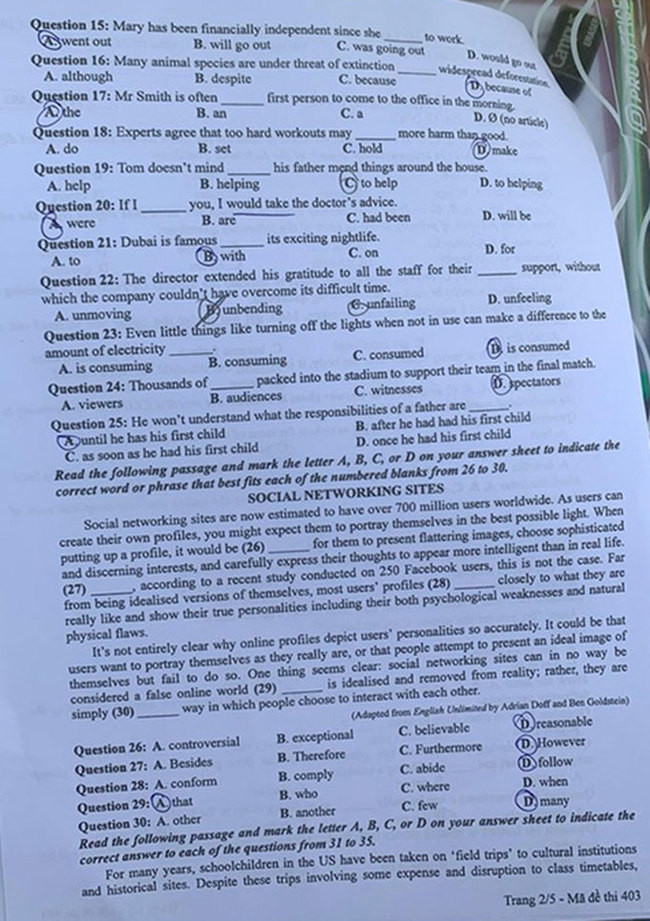

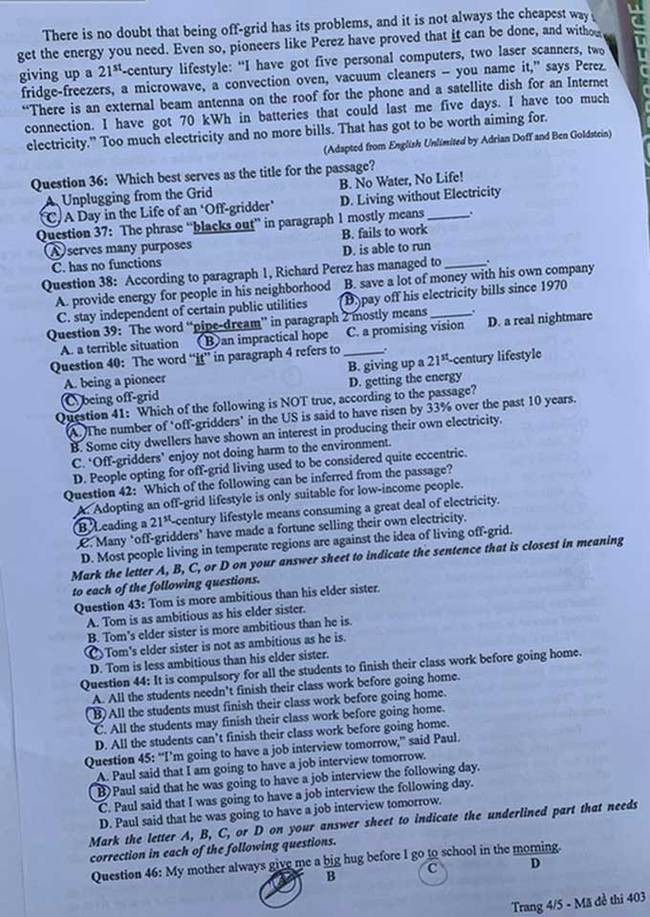
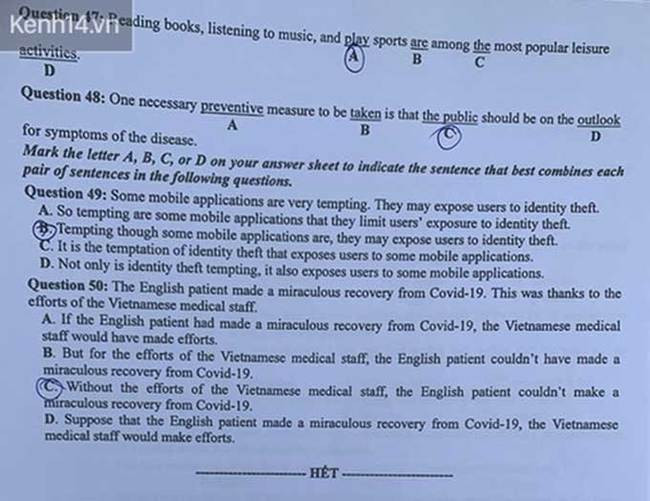
Đáp án Đề thi môn Tiếng Anh THPT Quốc gia 2020 - Mã đề 403
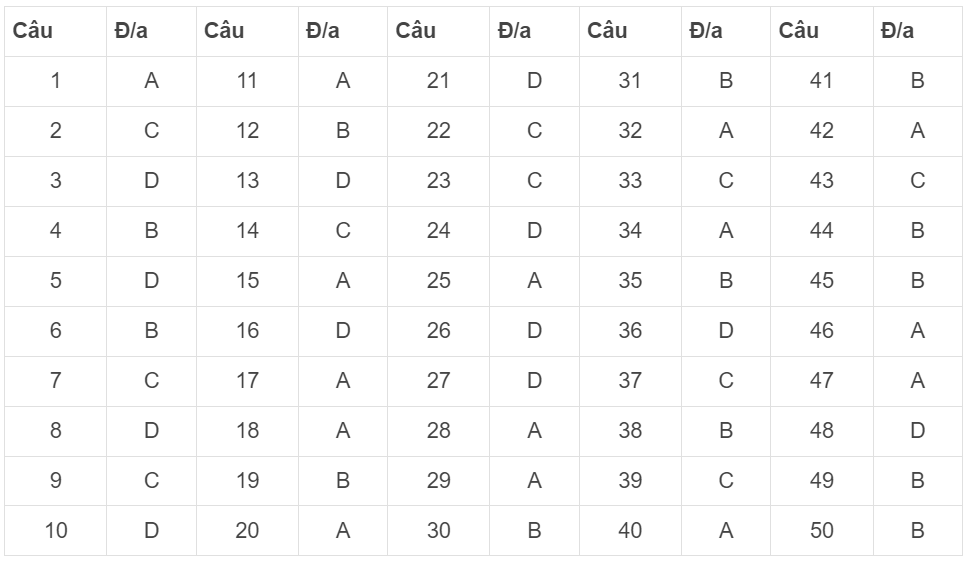
Mark the letter A, B, C, or D on your answer sheet to indicate the word whose underlined part differs from the other three in pronunciation in each of the following questions.
Question 1: A. lick B. bride C. prize D. slice
Giải thích:
A. lick /lɪk/
B. bride /braɪd/
C. prize /praɪz/
D. slice /slaɪs/
Question 2: A. brings B. trains C. talks D. clears
Giải thích:
A. brings /brɪŋz/
B. trains /treɪnz/
C. talks /tɑːks/
D. clears /klɪrz/
Mark the letter A, B, C, or D on your answer sheet to indicate the word that differs from the other three in the position of primary stress in each of the following questions.
Question 3: A. consider B. discover C. imagine D. decorate
Giải thích:
A. consider /kənˈsɪd.ɚ/
B. discover /dɪˈskʌv.ɚ/
C. imagine /ɪˈmædʒɪn/
D. decorate /ˈdekəreɪt/
Question 4: A. beauty B. success C. album D. question
Giải thích:
A. beauty /ˈbjuːt̬i/
B. success /səkˈses/
C. album /ˈæl.bəm/
D. question /ˈkwestʃən/
Mark the letter A, B, C, or D on your answer sheer to indicate the word(s) OPPOSITE in meaning to the underlined word(s) in each of the following questions.
Question 5: When I suggested he was mistaken, Mark got hot under the collar and stormed out of the room
A. felt anxious B. got emotional C. became furious D . remained calm
Giải thích: got hot under the collar (idiom) điên tiết, cáu tiết
A. cảm thấy lo lắng
B. xúc động
C. trở nên tức giận
D. vẫn giữ được bình tĩnh
Question 6: With so many bruises over the body, it is obvious that the child has had a bad fall.
A. unfair B. unclear C. known D. correct
Giải thích:
Obvious (a) rõ ràng
A. không công bằng
B. không rõ rang
C. được biết
D. chính xác
Mark the letter A, B, C. or D on your answer sheet to indicate the word(s) CLOSEST in meaning to the underlined word(s) in each of the following questions.
Question 7: The new movie was a big hit as tickets for most of the showings were sold out.
A. beat B. failure C. success D. threat
Giải thích:
Big hit: bom tấn, phổ biến
Question 8: Being a wise politician, Mr. Brown tends to reserve his judgements till he knows all the facts.
A. benefits B. bookings C. appearances D. decisions
Giải thích: judgement (n) xét xử
Mark the letter A, B, C, or D on your answer sheet to indicate the option the best completes the following exchanges.
Question 9: Pat and Sam are talking about doing exercise.
- Pat: "I don't think we should exercise late at night."
- Sam: “_____. This increases our heartbeats and makes it harder to sleep."
A. You can do it again B. I disagree with you
C. You're right D. It's not true
Giải thích:
Pat và Sam đang nói chuyện về việc tập thể dục.
-
Pat: “Tôi không nghĩ chúng ta nên luyện tập muộn vào buổi tối.
-
Sam: “_____”. Việc này làm tăng nhịp tim và khó để ngủ
A. Bạn có thể làm lại lần nữa
B. Tôi không đồng ý với bạn
C. Bạn nói đúng
D. Điều đó không đúng
Question 10: Anna is talking to Mark after their school's talent contest.
- Anna: "So, you are the winner. Congratulations!"
- Mark: “_____”
A. You're welcome. B. No problem.
C. Not at all. D. Thank you.
Giải thích:
Anna đang nói chuyện với Mark sau cuộc thi tài năng của họ ở trường.
-
Anna: “ Vây cậu là người chiến thắng. Chúc mừng nhé!”
-
Mark: “_____”
A. Không có gì
B. Không vấn đề gì
C. Không có gì
D. Cảm ơn cậu
Mark the letter A, B, C, or D on your answer sheet to indicate the correct answer to each of the following questions.
Question 11: You often drive to work, _____ ?
A. don't you B. didn't you C. won't you D. haven't you
Giải thích: Câu hỏi đuôi (tag question)
Question 12: Having your private life splashed across the front pages of newspapers and glossy magazines is part and _____ of being a celebrity.
A. package B. parcel C. packet D. post
Giải thích:
Be part and parcel of sth: là bản chất của cái gì đó, đặc biệt là một tính chất mà không thể tránh được.
Question 13: Sometimes it can be really _____ to go hiking alone in the forest.
A. dangerously B. danger C. endanger D. dangerous
Giải thích:
It can be (really) + adj … (dangerous – tính từ)
Question 14: Instead of reading stories from books, Michelle's father usually _____ stories to lull her to sleep
A. turns off B. makes up C. takes after D. gets on
Giải thích:
Make up a story = dựng chuyện, bịa chuyện
Question 15: Mary has been financially independent since she _____ to work.
A. went out B. will go out C. was going out D. would go out
Giải thích:
Mary đã độc lập tài chính từ khi cô ấy đi làm (đã xảy ra trong quá khứ)
Question 16: Many animal species are under threat of extinction _____ widespread deforestation.
A. although B. despite C. because D. because of
Giải thích: Because of + N/phrase = Bởi vì …
Question 17: Mr. Smith is often _____ first person to come to the office in the morning.
A. the B. an C. a D. ∅ (no article)
Giải thích: Mạo từ xác định “the first person” chính là Mr.Smith
Question 18: Experts agree that too hard workouts may _____ more harm than good.
A. do B. set C. hold D. make
Giải thích: do harm: gây hại
Question 19: Tom doesn't mind _____ his father mend things around the house.
A. help B. helping C.to help D. to helping
Giải thích: mind + Ving = để ý, ngại làm gì
Question 20: If I _____ you, I would take the doctor's advice.
A. were B. are C. had been D. will be
Giải thích: Câu điều kiện loại 2
Question 21: Dubai is famous _____ its exciting nightlife.
A. to B. with C. on D. for
Giải thích: famous for: nổi tiếng về
Question 22: The director extended his gratitude to all the staff for their _____ support, without which the company couldn't have overcome its difficult time.
A. unmoving B. unbending C. unfailing D. unfeeling
Giải thích: unfailing: chắc chắn, không bao giờ cạn
Question 23: Even little things like turning off the lights when not in use can make a difference to the amount of electricity _____.
A. is consuming B. consuming C. consumed D. is consumed
Giải thích: Mệnh đề quan hệ rút gọn
Question 24: Thousands of _____ packed into the stadium to support their team in the final match.
A. viewers B. audiences C. witnesses D. spectators
Giải thích: spectator: khán giả
Question 25: He won't understand what the responsibilities of a father are _____
A. until he has his first child B. after he had had his first child
C. as soon as he had his first child D. once he had his first child
Giải thích: until: cho tới khi (câu giả định xảy ra trong tương lai, động từ chia HTĐ)
Read the following passage and mark the letter A, B, C, or D on your answer sheer to indicate the correct word or phrase that best fits each of the numbered blanks from 26 to 30.
SOCIAL NETWORKING SITES
Social networking sites are now estimated to have over 700 million users worldwide. As users can create their own profiles, you might expect them to portray themselves in the best possible light. When putting up a profile, it would be (26) _____ for them to present flattering images, choose sophisticated and discerning interests, and carefully express their thoughts to appear more intelligent than in real life. (27) _____, according to a recent study conducted on 250 Facebook users, this is not the case. Far from being idealised versions of themselves, most users' profiles (28) _____ closely to what they are really like and show their true personalities including their both psychological weaknesses and natural physical flaws.
It's not entirely clear why online profiles depict users' personalities so accurately. It could be that users want to portray themselves as they really are, or that people attempt to present an ideal image of themselves but fail to do so. One thing seems clear: social networking sites can in no way be considered a false online world (29) _____ is idealised and removed from reality; rather, they are simply (30) _____ way in which people choose to interact with each other.
(Adapted from English Child by Adria Dedrand Ben Goldstein)
Question 26: A. controversial B. exceptional C. believable D. reasonable
Giải thích:
-
controversial (a) gây tranh cãi
-
B. exceptional (a) đặc biệt, ngoại lệ
-
C. believable (a) đáng tin
-
D. reasonable (a) hợp lý
Dịch: Khi lập một hồ sơ, sẽ là hợp lý nếu họ khoe ra những hình ảnh thổi phồng, lựa chọn những sở thích tinh tế và có nhận thức, và cẩn trọng bày tỏ suy nghĩ của mình để tỏ ra thông minh hơn ngoài đời.
Question 27: A. Besides B. Therefore C. Furthermore D. However
Giải thích:
A. Besides (adv/pre) ngoài ra, hơn nữa
B. Therefore (adv) bởi vậy, vì thế
C. Furthermore (adv) hơn thế nữa, hơn nữa
D. However (adv) tuy nhiên
Dịch: Tuy nhiên, theo một nghiên cứu gần đây được tiến hành với 250 người sử dụng Facebook, điều này lại không đúng.
Question 28: A. conform B. comply C. abide D. follow
Giải thích:
A. conform (v) dô dành, an ủi
B. comply (v) tuân theo
C. abide (v) chịu đựng, tồn tại
D. follow (v) theo dõi, theo đuôi
Dịch: Khác xa với phiên bản lý tưởng hóa của chính họ, hồ sơ của hầu hết người dùng thoải mái gần gũi với những điều họ thích và thể hiện tính cách thực sự của họ bao gồm những điểm yếu về tâm lý cũng như những khiếm khuyết tự nhiên về thể chất.
Question 29: A. that B. who C. where D. when
Giải thích:
A. that: đó, cái/ người mà…
B. who: ai, người
C. where: đâu, chỗ
D. when: khi nào, khi
Dịch: Một điều có vẻ rõ rảng: các trang mạng xã hội không thể nào được xem là một thế giới trực tuyến giả được lý tưởng hóa và bị loại ra khỏi đời thực.
Question 30: A. other B. another C. few D. many
Giải thích:
A. other: khác
B. another: một cái/ người khác
C. few: ít, một vài
D. many: nhiều
Dịch: Đúng hơn, chúng chỉ là một cách đơn giản khác mọi người lựa chọn để tương tác với nhau.
Read the following passage and mark the letter A, B, C, or D on your answer sheet to indicate the correct answer to each of the questions from 31 to 35.
For many years, schoolchildren in the US have been taken on 'field trips’ to cultural institutions and historical sites. Despite these trips involving some expense and disruption to class timetables, educators arrange them in the belief that schools exist not only to teach economically useful skills, but also to produce civilised young people who appreciate the arts and culture.
However, there have been increasing signs in recent years that the attitude towards field trips is changing, with a significant decrease in the number of tours organised for school groups. A survey carried out by a group of school administrators found that over half the schools they asked had decided to cancel trips planned for the next academic year.
So what are the reasons for this change? The most obvious one is the issue of finance. Because there are increasing demands on their funds, schools are forced to make a difficult choice about how to spend the limited money they have. Field trips are an obvious thing to cut since they are seen by many as a luxury. A large number of school heads also consider days spent away from school a waste of time, believing that the only worthwhile use of students' time is spent preparing for exams in the classroom.
But why should anybody worry if schoolchildren go on fewer trips? Those that believe this is a negative development in education would say that cultural field trips contribute to the development of students into well-educated adults who have a healthy interest in history and the arts. Researchers warn that if schools cut field trips, then valuable opportunities to broaden and enrich children's learning experiences are lost.
(Adapted from Bow Bower by Helen Chilion, Sheila Digita, Mark Fountain and Frances Treloar)
Question 31: What is the passage mainly about?
A. Positive changes in American schools B. Valuable academic learning experiences
C. New trends in educational development D. Field trips for schoolchildren
Giải thích:
Đoạn văn nói về điều gì?
A. Những thay đổi tích cực tại các trường học ở Mỹ
B. Những kinh nghiệm học tập có giá trị
C. Những xu hướng mới trong phát triển giáo dục
D. Những chuyến đi thực tế cho học sinh
Dịch: Trong nhiều năm, học sinh ở Mỹ được đưa đi thực địa tại các cơ sở văn hóa và di tích lịch sử.
Question 32: According to paragraph 1, educators believe that through field trips, children can _____
A. practise some outdoor activities B. enjoy their time at school
C. learn to value the arts and culture D. develop economically useful skills only
Giải thích:
A. Luyện tập một số hoạt động ngoài trời
B. Tận hưởng thời gian tại trường
C. Học cách trân trọng nghệ thuật và văn hóa
D. Chỉ phát triển một cách kinh tế các kỹ năng hữu ích
Dịch: Mặc dù những chuyến đi này liên quan đến một số chi phí và làm gián đoạn thời khóa biểu trên lớp, các nhà giáo dục sắp xếp chúng với niềm tin rằng trường học tồn tại không chỉ để dạy những kỹ năng hữu ích một cách kinh tế, mà còn đào tạo ra những người trẻ văn minh, biết trân trọng nghệ thuật và văn hóa.
Question 33: The word "they" in paragraph 2 refers to _____.
A. school administrators B. the schools
C. field trips D. school groups
Giải thích: “they” thay thế cho “school administrators”
A. ban giám hiệu
B. trường học
C. chuyến đi thực địa
D. Nhóm trường
Dịch:
Một khảo sát được thực hiện bởi một nhóm quản trị viên các trường chỉ ra một nửa số trường họ hỏi đã quyết định hủy các chuyến đi đã được lên kế hoạch trong năm học tới.
Question 34: The phrase "a luxury" in paragraph 3 mostly describes something which is _____
A. difficult and important B. new and common
C. expensive but not essential D. cheap but comfortable
Giải thích:
A difficult and important: khó và quan trọng
B. new and common: mới và thông dụng
C. expensive but not essential: đắt đỏ và không cần thiết
D. cheap but comfortable: rẻ và thoải mái
Dịch:
Vì yêu cầu về ngân quỹ ngày càng tăng, các trường học buộc phải đưa ra lựa chọn khó khăn về cách chi tiêu khoản tiền giới hạn mà họ có. Những chuyến đi thực địa là điều hiển nhiên phải cắt bỏ vì nhiều người xem chúng là một thứ xa xỉ.
Question 35: According to the passage, which of the following is TRUE?
A. The number of field trips organised for school groups is growing
B. Cutting field trips may mean fewer opportunities for students' cultural learning.
C. Most school heads find it not worthwhile for students to spend time preparing for exams.
D. Schools no longer have to pay for their students' field trips.
Giải thích:
Theo đoạn văn, câu nào sau đây là ĐÚNG?
A. Số lượng những chuyến đi thực địa được tổ chức cho các nhóm ở trường tăng
B. Cắt giảm những chuyến đi thực địa có thể tương đồng với ít cơ hội để học sinh học hỏi về văn hóa hơn
C. Hầu hết các nhà trường đều thấy rằng việc học sinh dành thời gian chuẩn bị cho các kỳ thi là không đáng
D. Trường học không còn trả tiền cho các chuyến đi thực địa của học sinh.
Câu trong đoạn văn có chứa nội dung được chọn: “Researchers warn that if schools cut field trips, then valuable opportunities to broaden and enrich children's learning experiences are lost.”
Dịch:
Các nhà nghiên cứu cảnh báo rằng nếu các trường cắt bỏ các chuyến đi thực địa, thì những cơ hội quý giá để mở rộng và làm phong phú thêm kinh nghiệm học tập của trẻ em sẽ mất đi.
Read the following passage and mark the letter A, B, C, or D on your answer sheet to indicate the correct answer to each of the questions from 36 to 42.
"I have not paid a single electricity bill since the year 1970," says Richard Perez with noticeable glee. He can afford to be smug. He lives "off-grid" - unconnected to the power grid and the water, gas and sewerage supplies that most people in the world rely on. He generates his own electricity, sources his own water and deals with his own waste disposal - and he prefers it that way. "There are times when the grid blacks out," he says. "I really like the security of having my own electricity company."
Perez is not alone. Once the preserve of mavericks, hippies and survivalists, there are now approximately 200,000 off-grid households in the United States of America, a figure that Perez says has been increasing by a third every year for the past decade. For all of the people who live off-grid, self-sufficiency means guilt-free energy consumption and peace of mind. "It feels brilliant to make use of clean, free energy that is not from fossil fuels," says Suzanne Galant, a writer who lives off-grid in a rural area in Wales. "And if something goes wrong, we can fix it ourselves." Now even urbanites are seeing the appeal of generating some if not all of their own power needs. So is energy freedom an eco pipe-dream or the ultimate good life?
Well, there is only one way to find out: begin to explore the possibilities of solar, wind or hydro power. But unless you live on a sunny, south-facing hillside with access to a nearby river or stream, that might prove prohibitively expensive!
There is no doubt that being off-grid has its problems, and it is not always the cheapest way to get the energy you need. Even so, pioneers like Perez have proved that it can be done, and without giving up a 21-century lifestyle: "I have got five personal computers, two laser scanners, two fridge-freezers, a microwave, a convection oven, vacuum cleaners - you name it," says Perez "There is an external beam antenna on the roof for the phone and a satellite dish for an Internet connection. I have got 70 kWh in batteries that could last me five days. I have too much electricity." Too much electricity and no more bills. That has got to be worth aiming for.
(Adapted from English Unlimited by Adrian Doff and Ben Goldstein)
Question 36: Which best serves as the title for the passage?
A. Unplugging from the Grid B. No Water, No Life!
C. A Day in the Life of an 'Off-gridder' D. Living without Electricity
Giải thích:
Lựa chọn nào là tốt nhất cho tiêu đề của đoạn văn?
A. Ngắt điện khỏi hệ thống lưới điện
B. Không nước, không sự sống
C. Một ngày trong cuộc sống của một người sử dụng hệ thống điện năng lượng mặt trời độc lập
D. Sống không có điện
Câu có chứa nội dung được chọn: “He lives "off-grid" - unconnected to the power grid and the water, gas and sewerage supplies that most people in the world rely on.”
Dịch: Ông ấy sống không có mạng lưới điện – không kết nối với lưới điện và các nguồn cung cấp nước, khí đốt và hệ thống thoát nước mà hầu hết mọi người trên thế giới dựa vào”
Question 37: The phrase "blacks out" in paragraph 1 mostly means _____.
A. serves many purposes B. fails to work
C. has no functions D. is able to run
Giải thích:
A. phục vụ nhiều mục đích
B. không hoạt động
C. không có chức năng gì
D. không thể hoạt động
“Black out” (phrasal verb) bất tỉnh, dừng hoạt động đột ngột trong thời gian ngắn – unconscious
Câu trong bài chứa nội dung trên: “"There are times when the grid blacks out," he says”
Dịch:
“Có những lúc lưới mất điện”, ông ấy nói.
Question 38: According to paragraph 1. Richard Perez has managed to _____.
A. provide energy for people in his neighborhood B. save a lot of money with his own company
C. stay independent of certain public utilities D. pay off his electricity bills since 1970
Giải thích: Theo như đoạn văn 1. Richard Perez đã cố gắng…
A. cung cấp năng lượng cho mọi người trong khi của ông ấy
B. tiết kiệm được rất nhiều tiền với công ty riêng của mình
C. không phụ thuộc (giữ độc lập) với một số tiện ích công cộng
D. trả hóa đơn tiền điện từ năm 1970
Câu trong bài chứa nội dung trên: “He generates his own electricity, sources his own water and deals with his own waste disposal - and he prefers it that way.”
Dịch: Ông ấy tự sản xuất điện, tự cung cấp nước và xử lý rác thải của chính mình- và ông ấy thích cách làm như vậy”
Question 39: The word "pipe-dream" in paragraph 2 mostly means _____.
A. a terrible situation B. an impractical hope C. a promising vision D. a real nightmare
Giải thích:
Từ “pipe-dream” trong đoạn văn 2 có nghĩa gần với…
A. một tình huống khủng khiếp
B. một hy vọng không thực tế
C. một tầm nhìn đầy hứa hẹn
D. một cơn ác mọng thật sự
Pipe dream (n) một ý tưởng hoặc một kế hoạch bất khả thi hoặc không có khả năng xảy ra.
Câu trong bài chứa nội dung trên: “So is energy freedom an eco pipe-dream or the ultimate good life?”
Dịch: Vậy tự do năng lượng có là một điều không khả thi hay là tận cùng cuộc sống tươi đẹp
Question 40: The word "it" in paragraph 4 refers to ____.
A. being a pioneer B. giving up a 21st century lifestyle
C. being off-grid D. getting the energy
Giải thích:
Từ “it” trong đoạn văn 4 nhắc đến…
A. trở thành người tiên phong
B. từ bỏ lối sống thế kỷ 21
C. không dùng điện lưới
D. tiếp nhận năng lượng
Câu trong bài có nội dung trên: “Even so, pioneers like Perez have proved that it can be done, and without giving up a 21-century lifestyle”
Dịch: Dù vậy, những người tiên phong như Perez đã chứng minh rằng điều đó (không dùng điện lưới) có thể xảy ra mà không phải từ bỏ phong cách sống ở thế kỷ 21.
Question 41: Which of the following is NOT true, according to the passage?
A. The number of 'off-gridders' in the US is said to have risen by 33% over the past 10 years.
B. Some city dwellers have shown an interest in producing their own electricity
C. ‘Off-gridders' enjoy not doing harm to the environment.
D. People opting for off-grid living used to be considered quite eccentric.
Giải thích:
A. Lượng người không suwe dụng lưới điện ở Mỹ được cho rằng tăng 33% trong 10 năm qua
Câu trong bài: “there are now approximately 200,000 off-grid households in the United States of America, a figure that Perez says has been increasing by a third every year for the past decade.”
Dịch: Hiện tại có gần 200,000 hộ không sử dụng điện lưới ờ Mỹ, con số mà Perez cho biết đã tăng 1/3 mỗi năm trong thập kỷ qua.
Question 42: Which of the following can be inferred from the passage?
A. Adopting an off-grid lifestyle is only suitable for low-income people.
B. Leading a 21st century lifestyle means consuming a great deal of electricity.
C. Many ‘off-gridders' have made a fortune selling their own electricity.
D. Most people living in temperate regions are against the idea of living off-grid.
Giải thích và dịch: Điều nào sau đây có thể được suy ra từ đoạn văn?
A. Thích nghi với phong cách không dùng điện lưới chỉ phù hợp với người thu nhập thấp – không được nhắc đến
B. Dẫn đầu lối sống thế kỷ 21 đồng nghĩa với việc tiêu thụ rất nhiều điện năng.
C. Nhiều người bán điện không nối lưới đã kiếm được nhiều tiền nhờ bán điện của chính họ. - không được nhắc đến
D. Hầu hết những người sống ở vùng ôn đới đều phản đối ý tưởng sống ngoài lưới điện. - không được nhắc đến
Mark the letter A, B, C, or D on your answer sheet to indicate the sentence that is closest in meaning to each of the following questions.
Question 43: Tom is more ambitious than his elder sister.
A. Tom is as ambitious as his elder sister.
B. Tom's elder sister is more ambitious than he is.
C. Tom's elder sister is not as ambitious as he is.
D. Tom is less ambitious than his elder sister.
Giải thích: So sánh ngang “as + adj + as”
Dịch: Chị gái của Tom không tham vọng bằng anh ấy”
Question 44: It is compulsory for all the students to finish their class work before going home.
A. All the students needn't finish their class work before going home.
B. All the students must finish their class work before going home.
C. All the students may finish their class work before going home.
D. All the students can't finish their class work before going home.
Giải thích: It’s compulsory… = must do something: bắt buộc, phải làm gì đó
Dịch: Tất cả học sinh phải hoàn thành bài tập trên lớp trước khi về nhà.
Question 45: "I'm going to have a job interview tomorrow," said Paul.
A. Paul said that I am going to have a job interview tomorrow.
B. Paul said that he was going to have a job interview the following day.
C. Paul said that I was going to have a job interview the following day.
D. Paul said that he was going to have a job interview tomorrow.
Giải thích: Câu tường thuật gián tiếp: am => was, tomorrow => the following day
Dịch: Paul nói rằng anh ấy sẽ đi phỏng vấn việc làm ngày mai.
Mark the letter A, B, C, or D on your answer sheet to indicate the underlined part that needs correction in each of the following questions.
Question 46: My mother always give me a big hug before I go to school in the morning.
A B C D
Giải thích: give => gives (chủ ngữ my mother = she)
Dịch: Mẹ tôi luôn ôm tôi thật chặt trước khi tôi đến trường vào buổi sáng.
Question 47: Reading books, listening to music, and play sports are among the most popular leisure activities.
A B C D
Giải thích: play => playing (danh động từ đóng vai trò là chủ ngữ trong câu)
Dịch: Đọc sách, nghe nhạc, và chơi thể thao là một trong những hoạt động giải trí phổ biến nhất.
Question 48: One necessary preventive measure to be taken is that the public should be on the outlook for
A B C D
symptoms of the disease.
Giải thích: outlook: quan điểm, có thể thay bằng awareness: nhận thức
Dịch: Một biện pháp phòng ngừa cần thiết phải được thực hiện là công chúng nên nhận biết các triệu chứng của bệnh.
Mark the letter A, B, C, or D on your answer sheer to indicate the sentence that best combines each pair of sentences in the following questions.
Question 49: Some mobile applications are very tempting. They may expose users to identity theft.
A. So tempting are some mobile applications that they limit users' exposure to identity theft.
B. Tempting though some mobile applications are, they may expose users to identity theft.
C. It is the temptation of identity theft that exposes users to some mobile applications.
D. Not only is identity theft tempting, it also exposes users to some mobile applications.
Giải thích:
B. Dù một số ứng dụng di động là hấp dẫn, chúng có thể khiến người dùng bị đánh cắp danh tính (đảo ngữ nhấn mạnh tính từ
Question 50: The English patient made a miraculous recovery from Covid-19. This was thanks to the efforts of the Vietnamese medical staff.
A. If the English patient had made a miraculous recovery from Covid-19, the Vietnamese medical staff would have made efforts.
B. But for the efforts of the Vietnamese medical staff, the English patient couldn't have made a miraculous recovery from Covid-19.
C. Without the efforts of the Vietnamese medical staff, the English patient couldn't make a miraculous recovery from Covid-19.
D. Suppose that the English patient made a miraculous recovery from Covid-19, the Vietnamese medical staff would make efforts.
Giải thích:
But for + Noun Phrases/Ving, S + could/would + have + Ved/PII…
Nếu không vì...
Dịch:
A. Nếu bệnh nhân người Anh hồi phục thần kỳ sau khi bị Covid-19 thì các nhân viên y tế Việt Nam cũng phải nỗ lực
B. Nếu không có những nỗ lực của các nhân viên y tế Việt Nam, bệnh nhân người Anh không thể hồi phục thần kỳ vì Covid-19
C. Không có những nỗ lực của các nhân viên y tế Việt Nam, bệnh nhân người Anh đã không thể hồi phục thần kỳ bởi Covid-19
D. Giả sử bệnh nhân người Anh hồi phục thần kỳ nhờ Covid-19 thì các nhân viên y tế Việt Nam sẽ nỗ lực.
Đề thi môn Tiếng Anh THPT Quốc gia 2020 - Mã đề 404
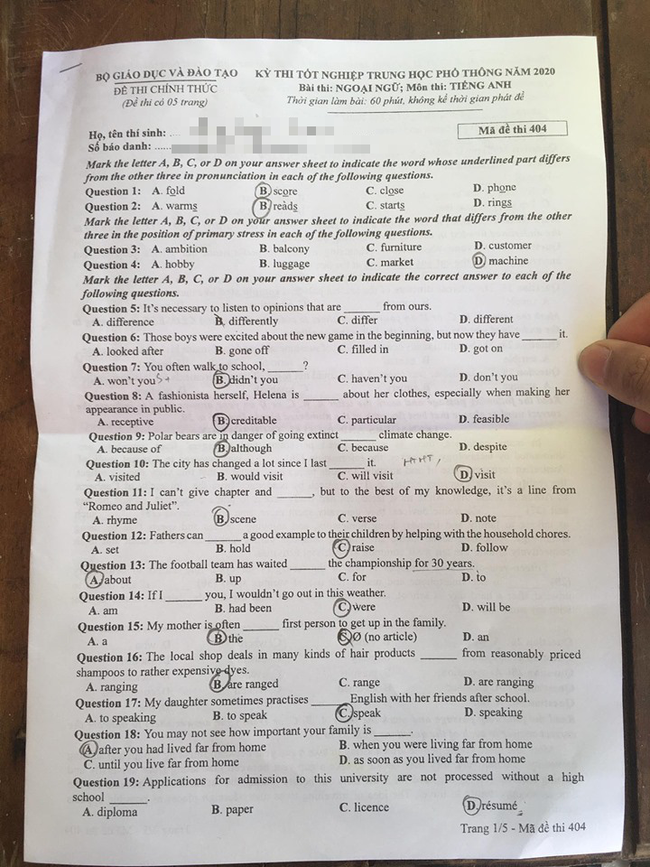
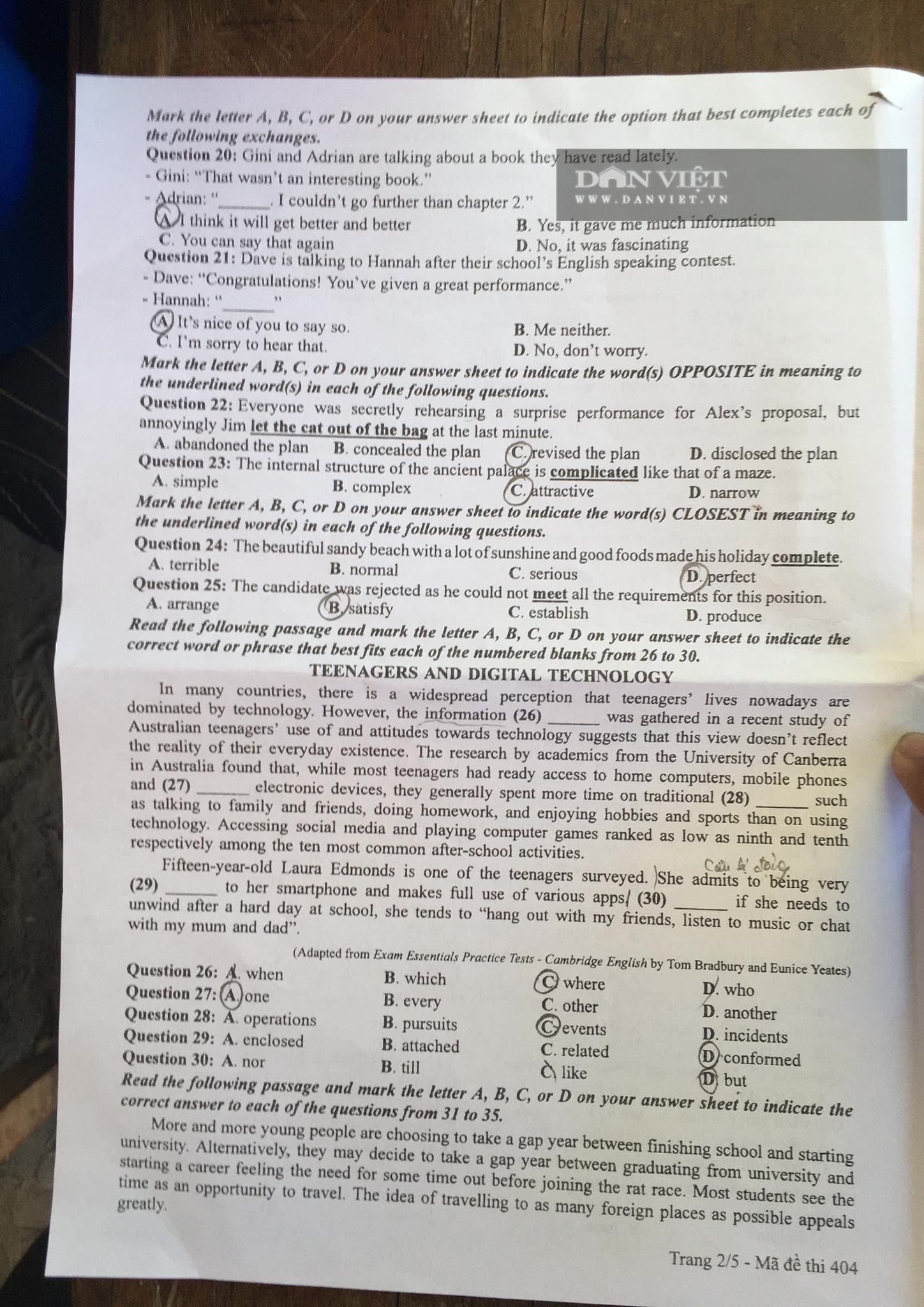
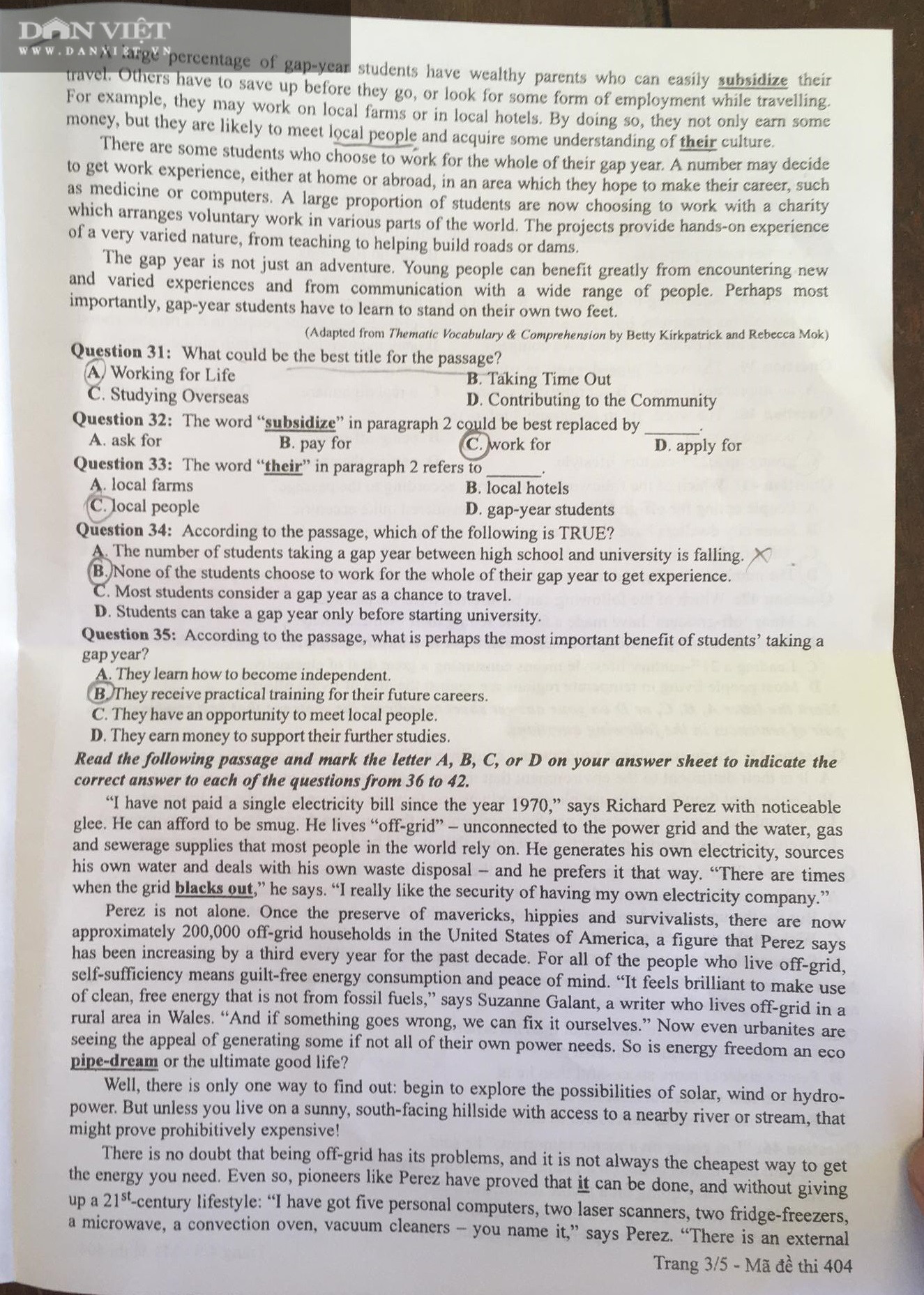
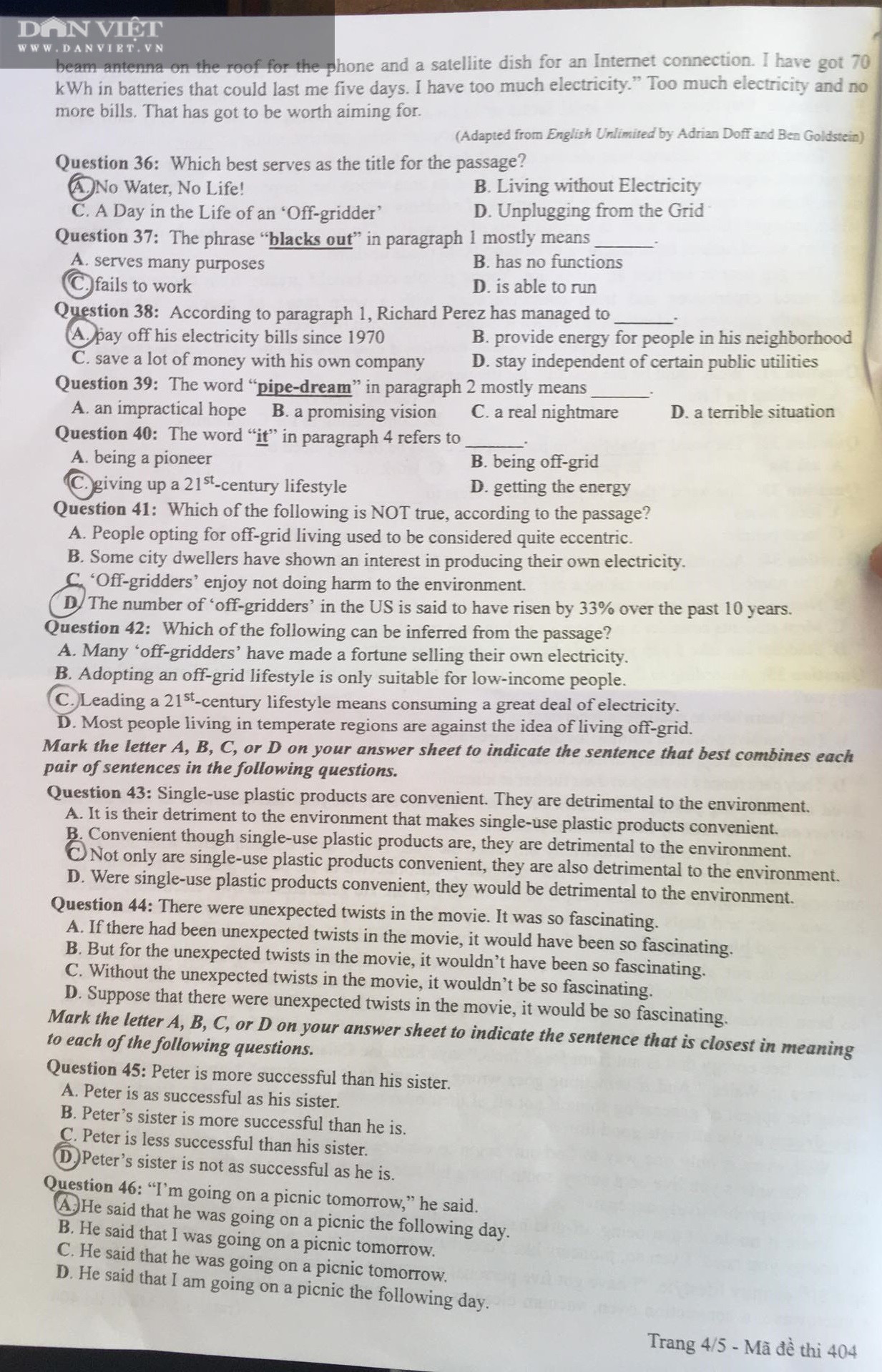
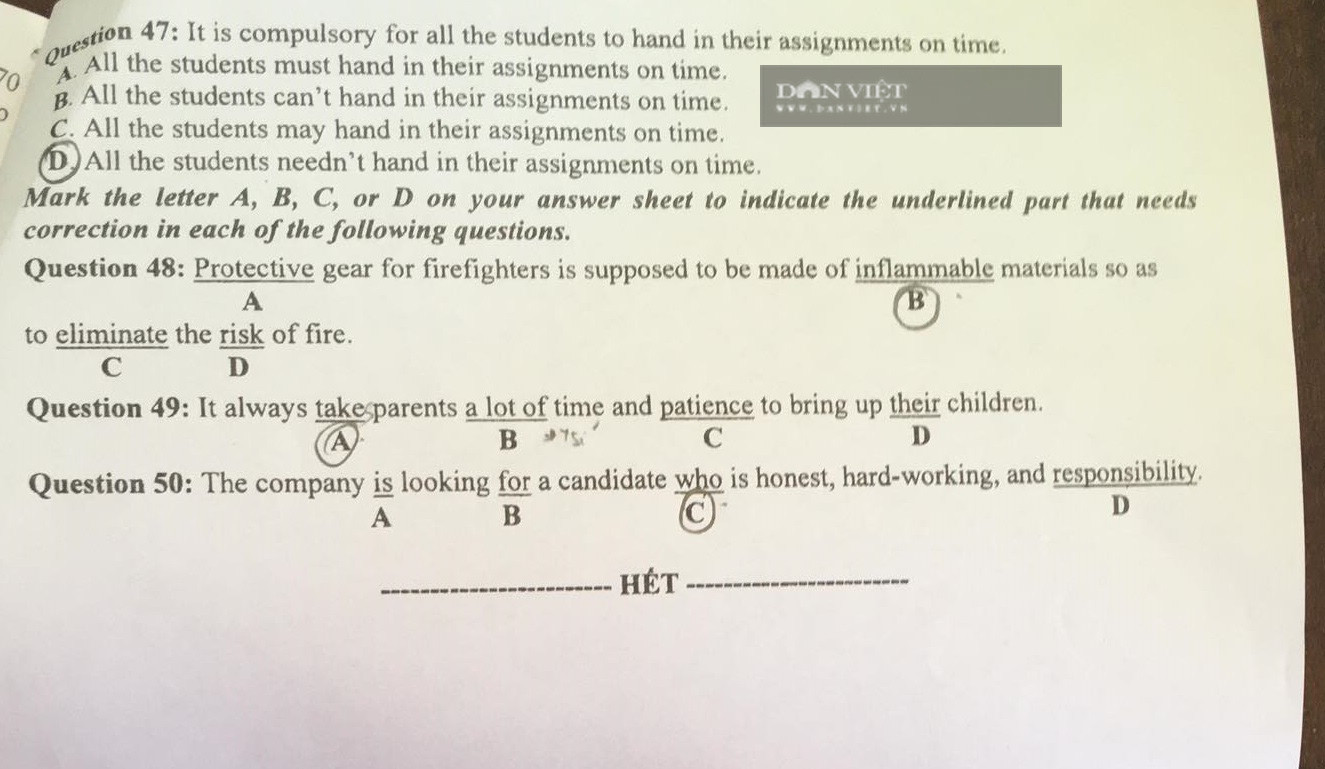
Đáp án Đề thi môn Tiếng Anh THPT Quốc gia 2020 - Mã đề 404
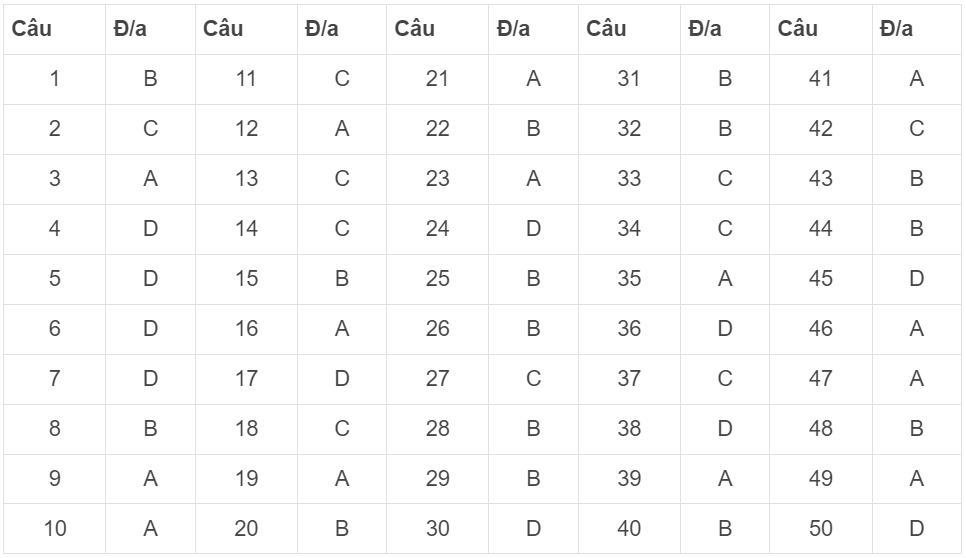


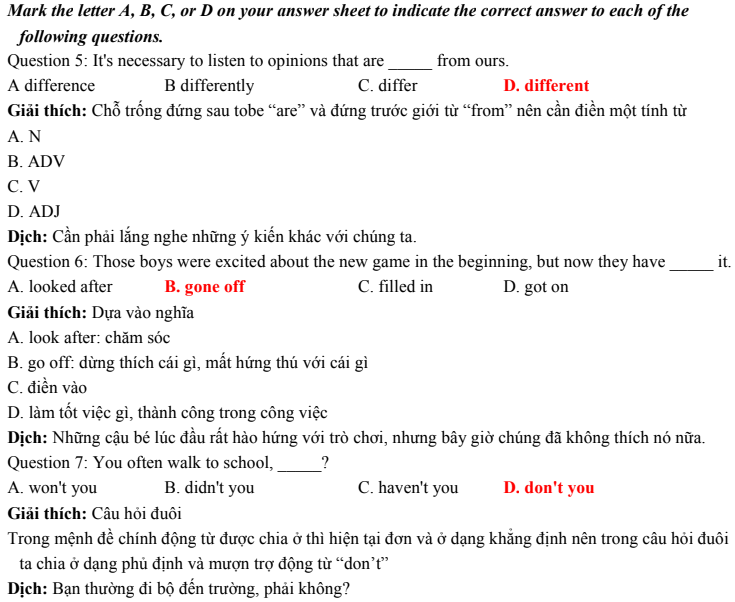
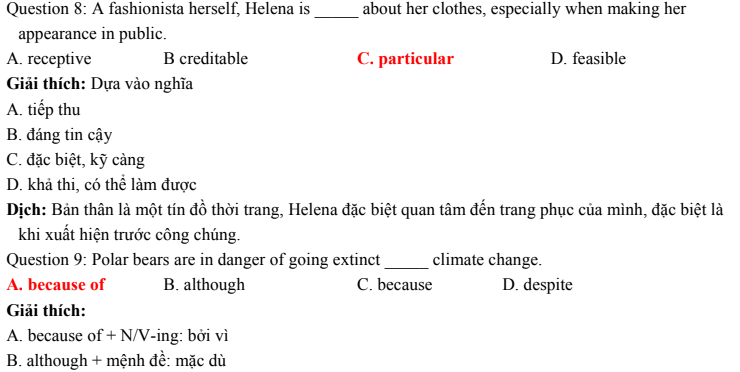
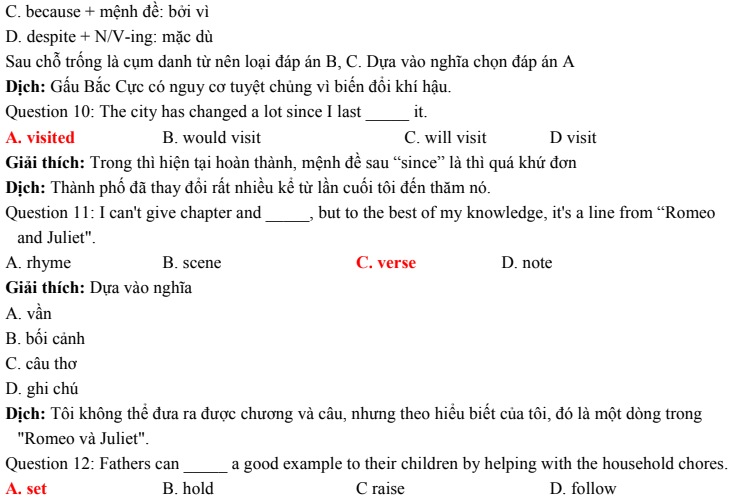
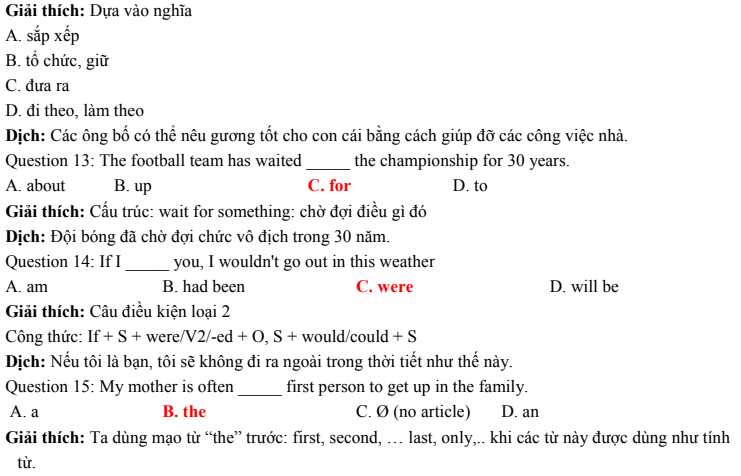
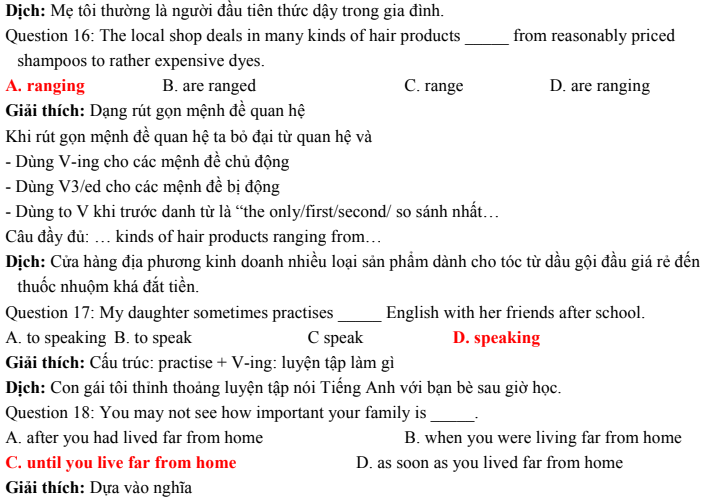
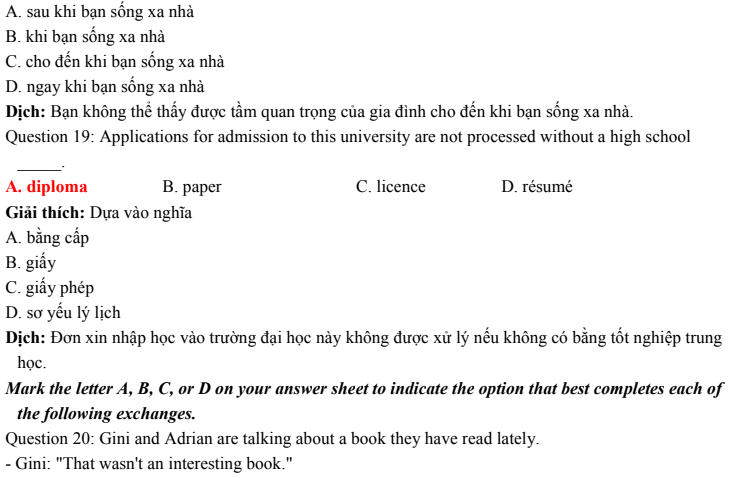
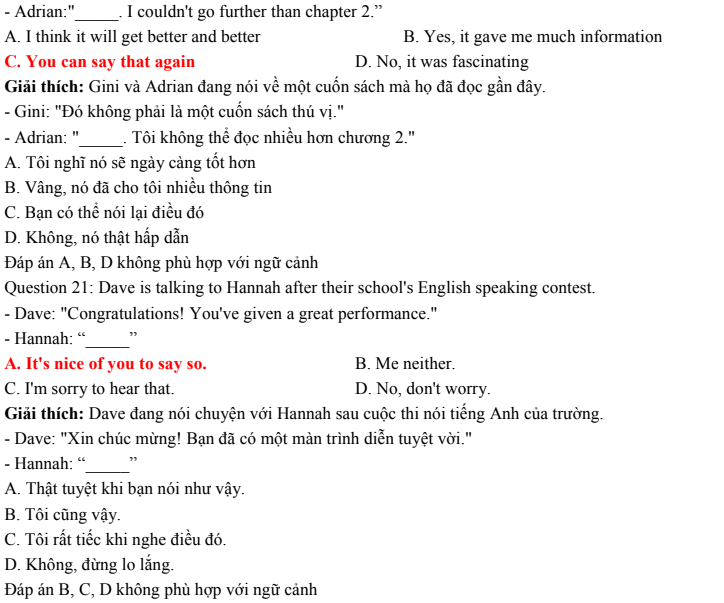

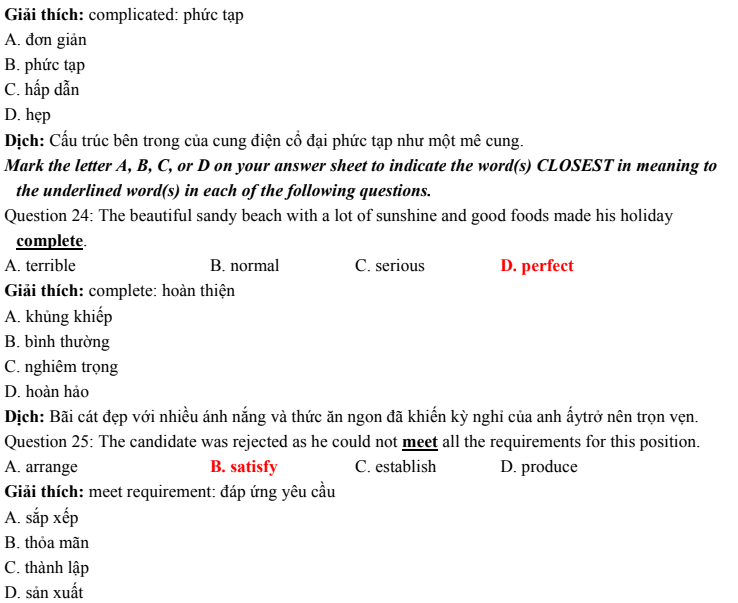
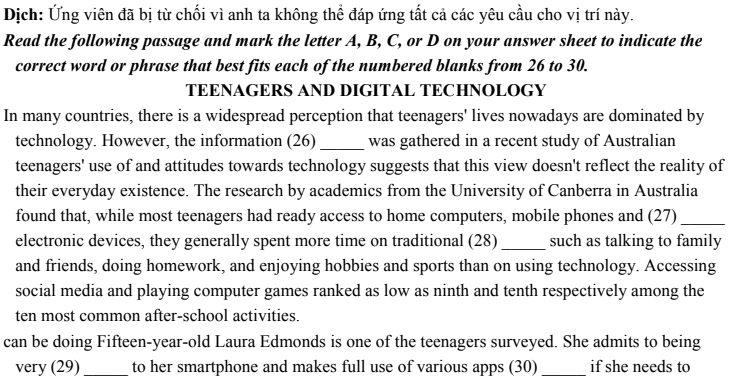

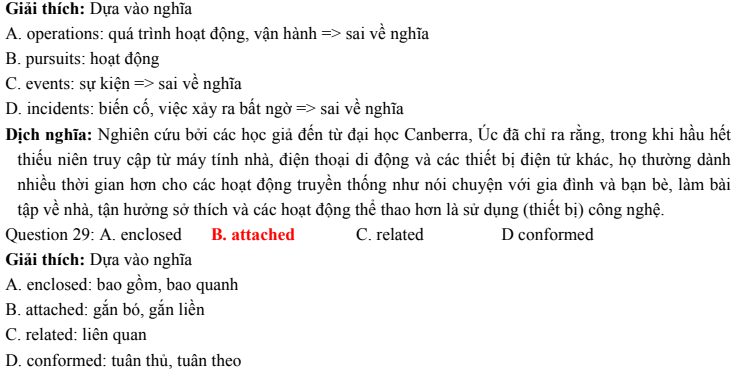
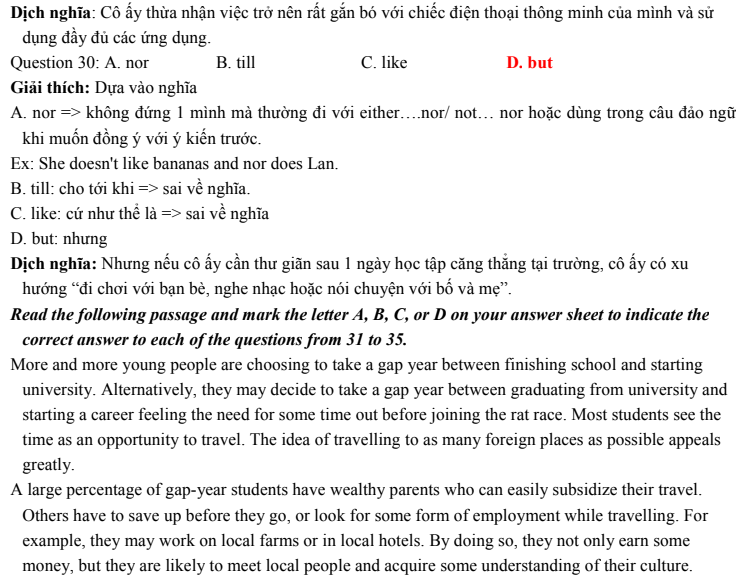
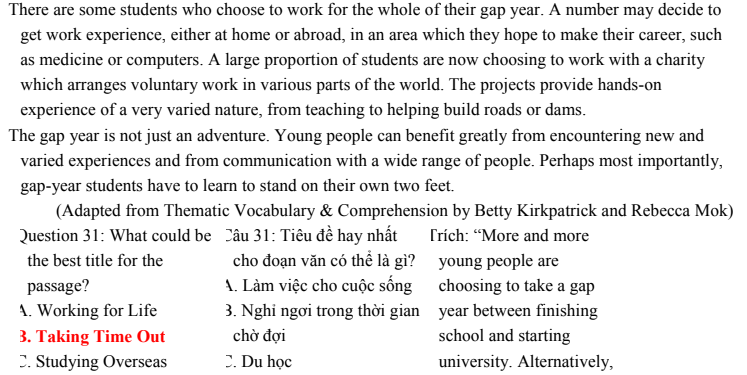
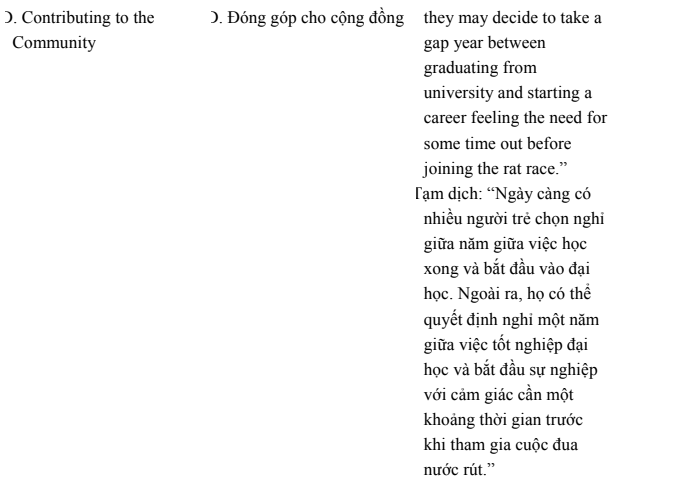
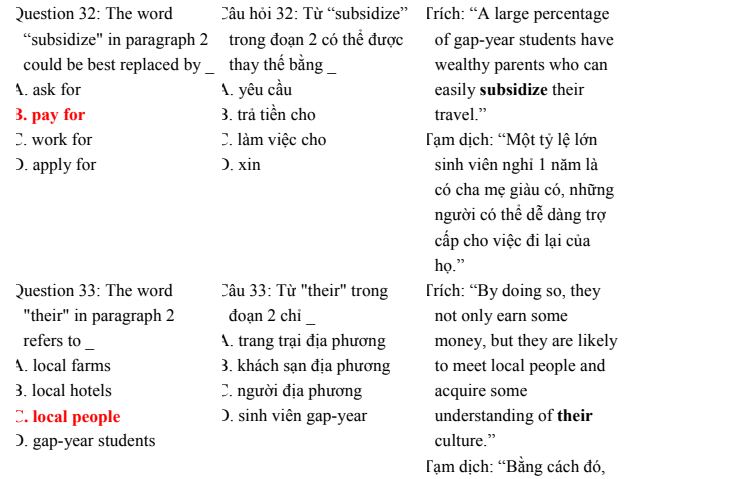
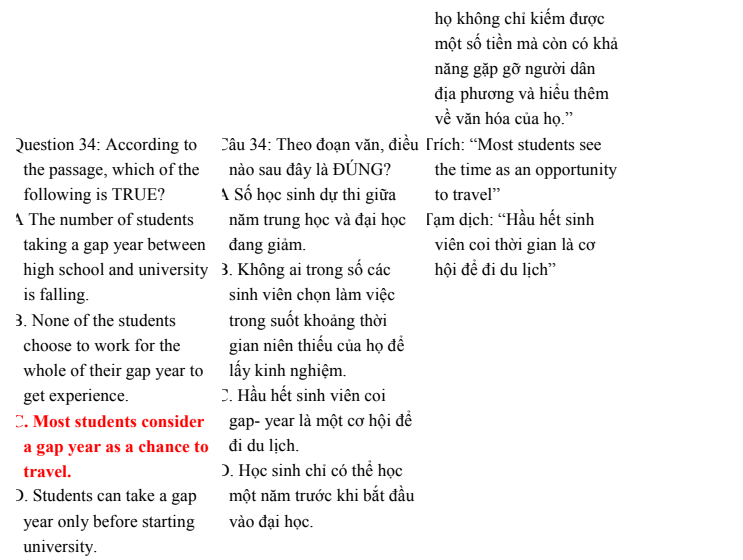

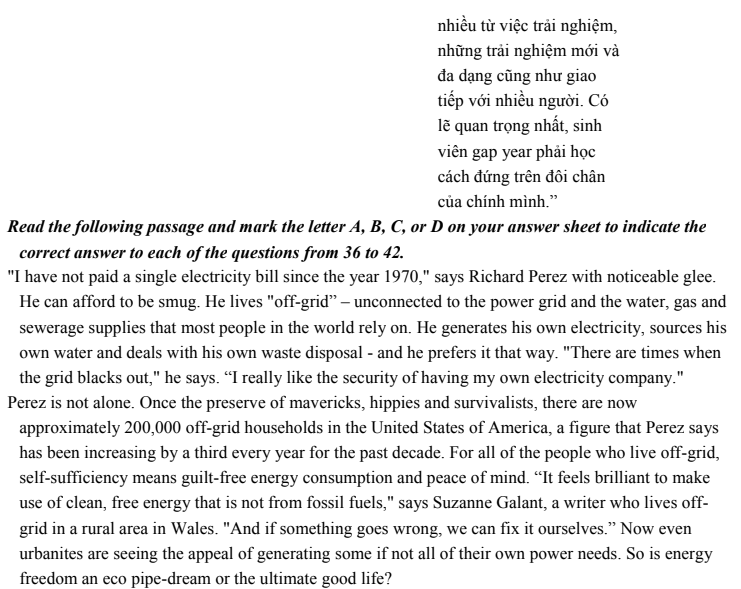
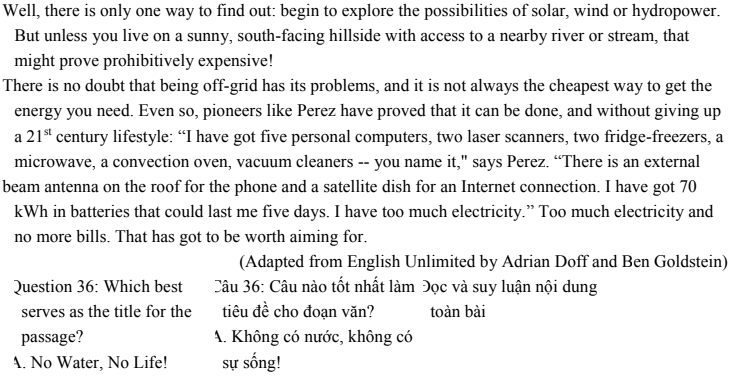

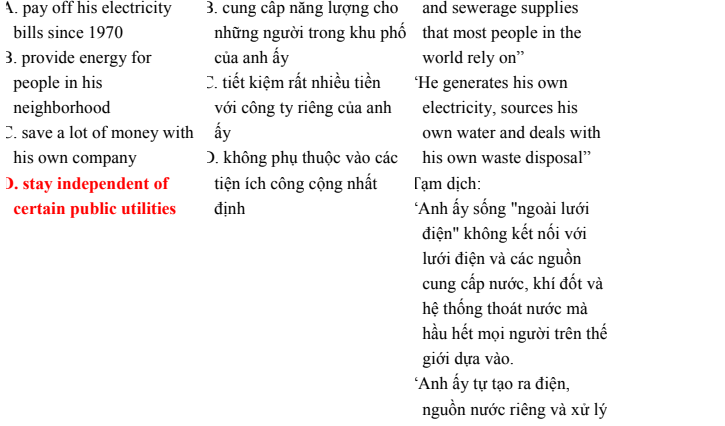
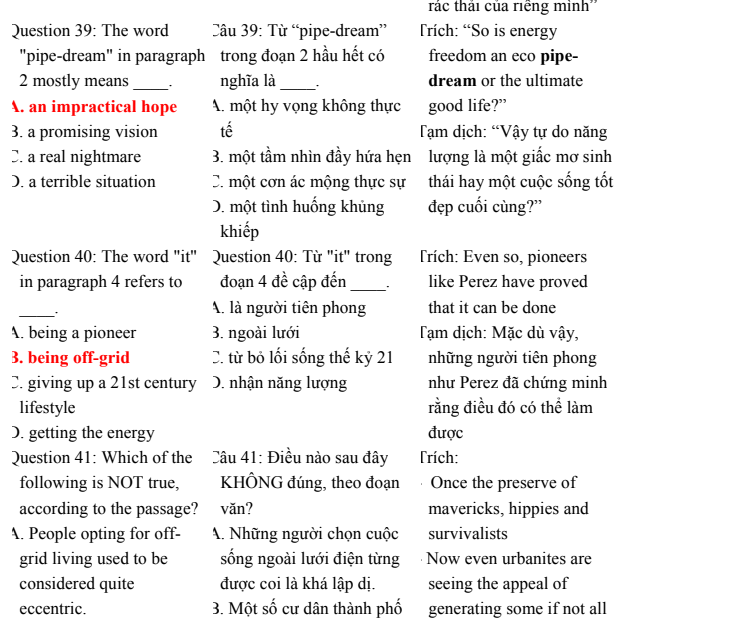
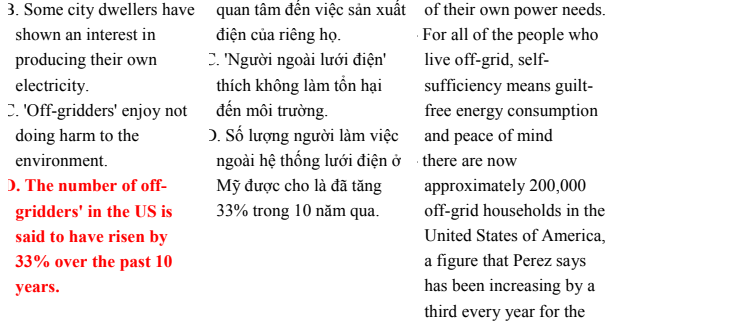
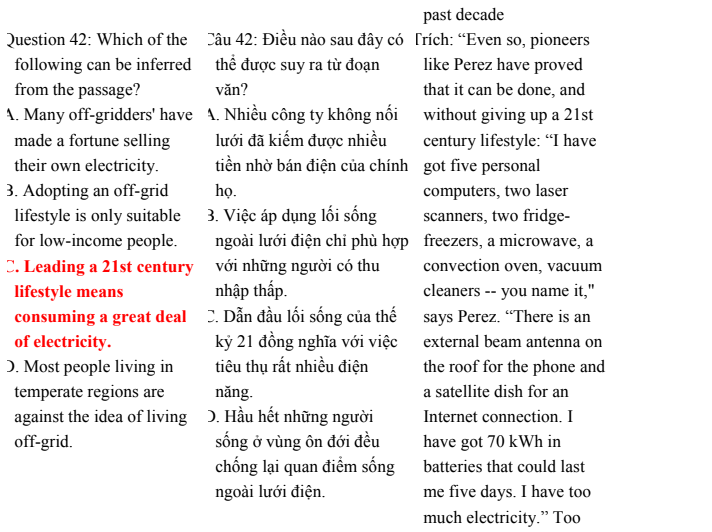
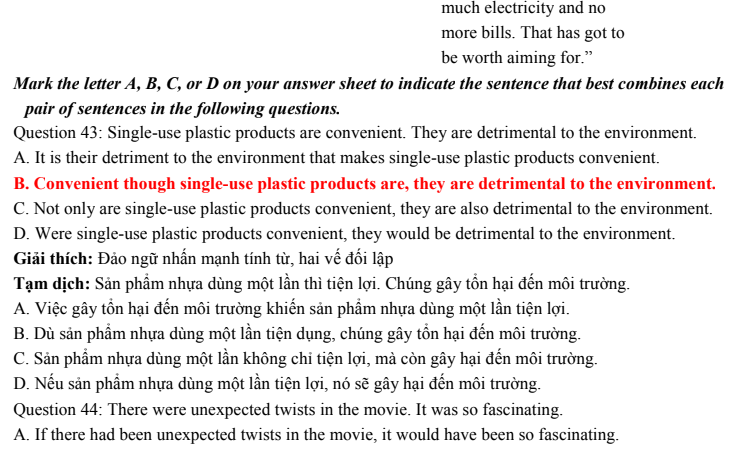
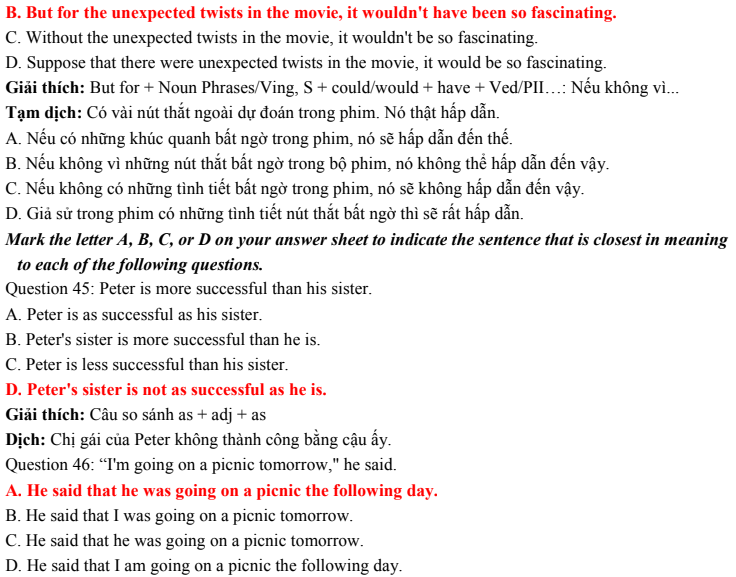
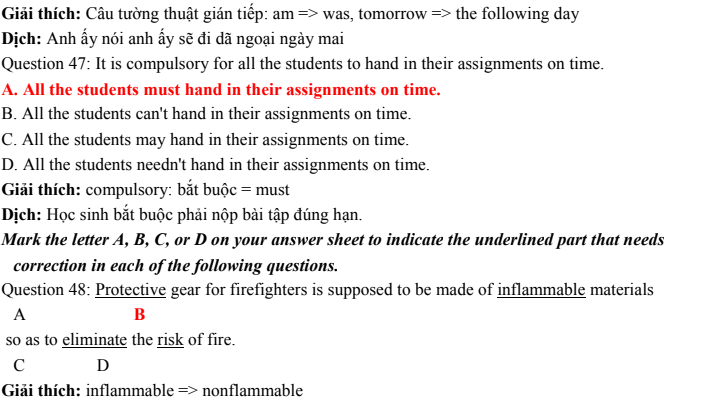
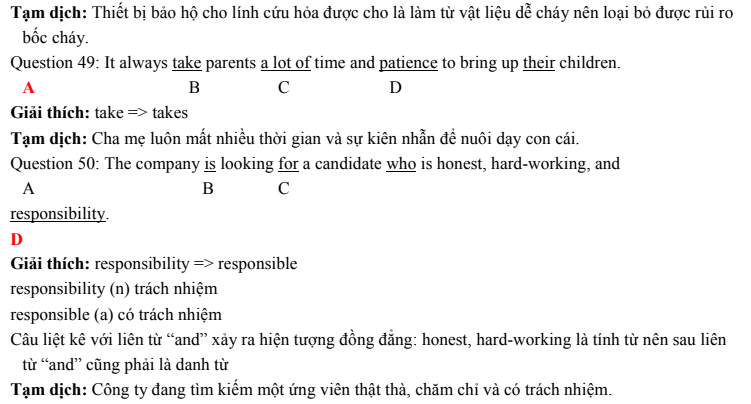
Xem thêm các chương trình khác:
- TOP 100 Đề thi Lịch sử lớp 12 Học kì 1, Học kì 2 năm 2023 - 2024 có đáp án
- TOP 100 Đề thi Vật lí lớp 12 Học kì 1, Học kì 2 năm 2023 - 2024 có đáp án
- TOP 100 Đề thi Giáo dục công dân lớp 12 Học kì 1, Học kì 2 năm 2023 - 2024 có đáp án
- TOP 100 Đề thi Địa lí lớp 12 Học kì 1, Học kì 2 năm 2023 - 2024 có đáp án
